Archived News Items
Return to Home
Page
Eritrea: Head of Orthodox
church 'frozen' from his post
The head of the
Eritrean Orthodox Church has 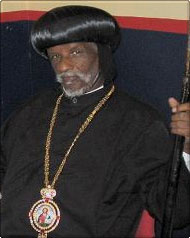 been relieved
of all administrative duties and removed from effective control of the
Patriarchate.
been relieved
of all administrative duties and removed from effective control of the
Patriarchate.
Following a Holy Synod held from 6 - 7 August, Patriarch
Abune Antonios has been 'frozen' from his post after attempts to unseat him
ended in failure, according to an official letter dated 9 August 2005 and leaked
to Eritrean website Asmarino.com
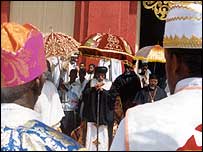 According to
Asmarino.com , the 'freezing' of individuals who fall out of favour with the
government is prevalent in Eritrea and is primarily undertaken as an act of
humiliation. Article 32 of the constitution of the Orthodox Church states that
its administrative body, the Holy Synod, is meant to function under the
chairmanship of the Patriarch who is the chief administrator of the church.
According to
Asmarino.com , the 'freezing' of individuals who fall out of favour with the
government is prevalent in Eritrea and is primarily undertaken as an act of
humiliation. Article 32 of the constitution of the Orthodox Church states that
its administrative body, the Holy Synod, is meant to function under the
chairmanship of the Patriarch who is the chief administrator of the church.
However, it would appear that Patriarch Antonios will henceforth be
confined to a ceremonial role and is no longer permitted to have any input into
the day-to-day running of the Patriarchate. Instead, and contrary to the
church's constitution, administrative authority may now rest in the hands of Mr
Yoftahe Dimetros, a government-appointed lay person.
In May 2002 the
government of Eritrea ordered the closure of all Christian denominations except
Orthodoxy, Roman Catholicism and Evangelical Lutheranism, and ended all other
religious practices apart from Islam. However, members of government-sanctioned
churches have also experienced repression, and the 'freezing' of the Patriarch
is the latest indication of mounting government interference in the internal
affairs of Eritrea's largest church.
Since his ordination in April 2004,
Patriarch Antonios is said to have become increasingly critical of the
government's continual interventions into church matters.
In January
2005, and for the first time ever, the traditional Orthodox Annual Christmas
message was not aired on national media after the Patriarch allegedly objected
to the detention in November 2004 of three Orthodox priests from the Medhane
Alem Church, and accused the government of interfering in church affairs. The
Patriarch also opposed requests to close down the church, which is linked to the
Orthodox renewal movement and attracts thousands of young people.
More
recently, Asmarino.com reports that prior to his removal from administrative
duties, the Patriarch had increasingly begun to challenge the regime on
spiritual grounds, and had objected to government intrusion through Mr Dimetros
in the administration of the Patriarchate. Mr Dimetros himself has become
increasingly infamous. It has emerged that Mr Dimetros repeatedly clashed with
the Patriarch as he attempted to coerce the Orthodox Church to adopt government
inspired policies. Mr Dimetros is also reported to have accompanied an Eritrean
Bishop to the seat of the Egyptian Orthodox Church in July in an attempt to
persuade the Papacy to replace Patriarch Antonios with this Bishop.
In
an indication of Mr Dimetros' current notoriety, a letter dated 30 July 2005
from the Eritrean Orthodox Church in America, called for his 'immediate removal
from the illegal position he holds' and his replacement by a bishop who fulfils
the criteria outlined in the church's constitution and 'has the interest of the
Church and her sacred mission at heart'.
Mervyn Thomas, Chief Executive
of CSW, said: "We are dismayed by this unwarranted intervention in the affairs
of the Orthodox Church. The discourteous treatment of the Primate of a church
that is supposed to have government sanction suggests that in reality the
Eritrean regime is attempting to curtail every expression of Christianity in
that country."
For more information, please contact Richard
Chilvers, Communications Manager at Christian Solidarity Worldwide on 020 8329
0045 or email mailto:richard.chilvers@csw.org.ukSource:
http://www.csw.org.uk/latestnews/print.php?id=424
UOC–KP
Orthodox Synod Accepts Moldovan Parishes
Kyiv– Among its
decisions, the Holy Synod of the Ukrainian Orthodox Church–Kyivan Patriarchate
(UOC – KP) has accepted nine parishes in the neighboring Republic of Moldova
into the UOC–KP, uniting them in a separate eparchy. The synod met at the
residence of Patriarch Filaret (Denysenko), head of the UOC-KP, on 27 July
2005.
Archimandrite
Filaret (Panku), superior of the Monastery of St. Nicholas of Chisinau, was
appointed administrator of the Moldovan eparchy. His hierarchical ordination
is to take place in Kyiv.
The synod also filled the vacant Kharkiv
eparchy, appointing Bishop Lavrentii (Myhovych) of Vyshhorod as bishop of
Kharkiv and Bohodukhiv.
The synod also approved statutes for the
seminaries and spiritual academies of the UOC–KP with amendments, started a
graduate studies department at the Kyiv Spiritual Academy, and approved a
decree on training scholars, theologians and teachers of higher qualification
in the UOC–KP.
Archbishop Oleksandr of Bila Tserkva was appointed head
of the Administration for External Church Relations.
The synod gave
its blessing to the reopening of the Monastery of the Elevation of the Cross
in the village of Pantaliia, Dubno district, in northwestern Ukraine's Rivne
region.
Source: • http://www.uaorthodox.org./news.php?pid=569
UOC–KP
Orthodox Head Visits Libya
Kyiv –
Patriarch Filaret (Denysenko), head of the Ukrainian Orthodox Church–Kyivan
Patriarchate (UOC – KP), visited the Libyan Jamahiriya on 24–26 July 2005,
following an invitation from the Association of Global Islam Call. During his
visit to this Islamic country, the hierarch met with a number of state,
religious and civic figures. His goal was not only to strengthen
Libyan-Ukrainian interstate relations, but to enliven interchurch and
interreligious communication and understanding.
Patriarch
Filaret had an official meeting with the secretary general of the Association
of Global Islam Call and the secretary for information and culture of the
Chief People's Committee for Foreign Relations and International Cooperation.
Important meetings also took place in Catholic and Coptic Orthodox churches of
Tripoli and other cultural and religious centers of Libya.
In meeting
with professors of history and religion and journalists, the patriarch
expressed his approval of the association's activities. The Association of
Global Islam Call consistently broadens perspectives of religious and cultural
communication. “Dialogue," Patriarch Filaret stressed, "is the way we should
follow to solve the problems of today. Terrorism and violence have no religion
and no homeland, so it is unjust to connect them to any religion or culture.
It is a global phenomenon, and all should look for its causes, clearly define
its essence, and cooperate in fighting it,” he noted.
In turn, the
association highly praised the role of the UOC-KP in establishing tolerant
relations with all religious and cultural components of Ukrainian society,
especially Muslims, who, together with Christian Ukrainians, are actively
building Ukraine.
Source: • http://www.cerkva.org.ua/site/modules.php?name=News&file=view&news_id=651
UOC-KP Orthodox
Pray for Pope
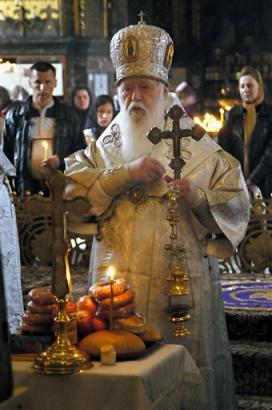 A panakhyda
(memorial service) for the late Pope John Paul II was held at St. Volodomyr's
Cathedral of the Ukrainian Orthodox Church-Kyivan Patriarchate (UOC-KP) on 8
April 2005. According to Ukraine's TV Channel 5, this was the first time in the
history of the Orthodox Church that a Pope was prayed for in an Orthodox
Cathedral.
A panakhyda
(memorial service) for the late Pope John Paul II was held at St. Volodomyr's
Cathedral of the Ukrainian Orthodox Church-Kyivan Patriarchate (UOC-KP) on 8
April 2005. According to Ukraine's TV Channel 5, this was the first time in the
history of the Orthodox Church that a Pope was prayed for in an Orthodox
Cathedral.
Patriarch Filaret (Denysenko), head of the UOC-KP, personally
celebrated the service. “It is probably the first time in the history of the
Orthodox Church when people pray for the soul of a deceased Pope in Ukraine,”
said the patriarch. “Prayers for Pope John Paul II today were the manifestation
of Christian love which is inherent in every Christian.”
The patriarch
met the late Pope John Paul II during the papal visit to Ukraine in June 2001.
Sources: Channel
5, BBC Monitoring Service, Action Ukraine Report
Orthodox
Hierarchs of Ukraine Send Condolences on Pope's Death
Patriarch Filaret
(Denysenko), head of the Ukrainian Orthodox Church-Kyivan Patriarchate,
Metropolitan Volodymyr (Sabodan), head of the Ukrainian Orthodox Church–Moscow
Patriarchate (UOC-MP), and Archbishop Ihor (Isichenko) of Kharkiv and Poltava of
the Ukrainian Autocephalous Orthodox Church (UAOC) sent condolences on the death
of Pope John Paul II. The letters of condolence were sent on 3 and 4 April 2005.
Patriarch Filaret sent letters of condolences to Cardinal Lubomyr
(Husar), head of the Ukrainian Greek Catholic Church, and Cardinal Marian
Jaworski, head of the Conference of Roman Catholic Bishops in Ukraine, on 3
April.
Patriarch Filaret wrote: “The Orthodox Church highly values the
great contribution of the late Pontiff to the cause of peace, the establishment
of mutual contacts and cooperation between Orthodox and Catholic faithful, and
his activities to protect Christian spirituality and morals.” The patriarch
expressed his hope that John Paul II's successor at the Holy See “will worthily
carry on his cause of bearing witness to Christ's Gospel through his preaching
and actions.”
On 4 April, the official site of the UOC–MP posted a
telegram that Metropolitan Volodymyr sent to Archbishop Ivan Jurkovic, papal
nuncio to Ukraine. “From the whole Ukrainian Orthodox Church, please accept our
sincere expressions of sympathy on the death of the head of the Roman Catholic
Church, His Holiness Pope John Paul II. May the merciful God, king of heaven and
earth, give repose to his soul in his heavenly abode,” the message reads.
Condolences on the death of the Pope were also sent by UAOC Archbishop
Ihor. “The clergy and faithful of the Ukrainian Autocephalous Orthodox Church
eparchy of Kharkiv and Poltava are praying for the eternal repose of the
deceased and his glorification in the kingdom of heaven, and send their
fraternal Christian sympathies to the faithful of the Catholic Church, orphaned
by the death of their prime hierarch, a great worker in Christ's vineyard and an
apostle of forgiveness and love.”
Sources:• http://www.uaorthodox.org./article.php?pid=393
•
http://www.pravoslavye.org.ua/index.php?r_type=news&action=fullinfo&id=6504
Christians,
Muslims and Jews united in tribute
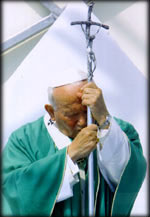 Never has the death of
a Pope elicited so much praise from other faiths, uniting Christians, Jews,
Muslims and even atheists in mourning.
Never has the death of
a Pope elicited so much praise from other faiths, uniting Christians, Jews,
Muslims and even atheists in mourning.
In the Holy Land,
pilgrims, clergy and Palestinian worshippers packed churches. Foreign tourists
in Bethlehem, Jerusalem and Nazareth sat in pews alongside Israeli Arab and
Palestinian Christians to pay their last respects.
Mahmoud Abbas,
the Palestinian President, called the Pope “a great religious figure who devoted
his life to defending the values of peace, freedom, justice and equality for all
races and religions, as well as our people's right to independence”.
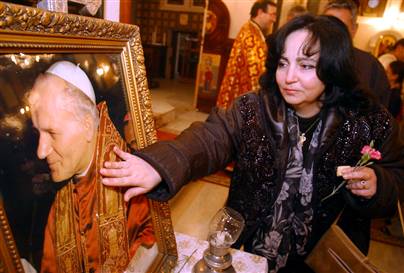 Even Islamic
fundamentalist groups such as Hamas and Islamic Jihad joined in the chorus: “We
remember the statements of His Holiness the Pope on the rights of the
Palestinians, and we hope that the Vatican leadership will stick to his position
against the occupation,” Sami Abu Zohari, a Hamas spokesman, said.
Even Islamic
fundamentalist groups such as Hamas and Islamic Jihad joined in the chorus: “We
remember the statements of His Holiness the Pope on the rights of the
Palestinians, and we hope that the Vatican leadership will stick to his position
against the occupation,” Sami Abu Zohari, a Hamas spokesman, said.
In Pakistan,
Hafiz Hussain Ahmed, of the Islamist Muttahida Majlis-e-Amal alliance, said the
world had lost a man of peace. “George Bush's talk of a crusader war was a clear
negation of Pope John Paul's efforts to promote interfaith dialogue and
harmony,” he said.
In Cairo the Arab
League saluted the Pope by lowering flags at its headquarters to half-mast.
Hossam Zaki, its spokesman, said the Pope had helped to avoid “unnecessary
misunderstandings” between Christians and Muslims over Western government
policies in the region.
President Khatami
of Iran said the Islamic Republic had learned with “extreme sadness” of the
Pope's death, saying that he commanded “the three paths of religious learning,
philosophical thought and poetical and artistic creativity”.
Communist Cuba
hailed the Pope's commitment to the poor and rejection of unbridled capitalism,
while China — displeased with the Vatican's recognition of Taiwan — offered
condolences but pointedly expressed the hope that its ties to the Holy See would
improve under his successor. To Read the Entire Article CLICK HERE>>>
UOC–KP Orthodox
Bishop of Lutsk-Volyn Considers Statement of Constantinople Represenative Fair
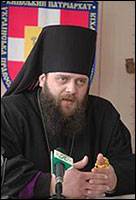 The 24 March
statement of Archbishop Vsevolod (Majdanski), a representative of the
Patriarchate of Constantinople, in which the archbishop said the patriarchate
only recognizes the canonical territory of the Moscow Patriarchate in its
pre-1686 boundaries, before the addition of the Kyiv Metropolitanate, is serious
and fair. This is according to Bishop Mykhail (Zinkevych) of Lutsk and Volyn of
the Ukrainian Orthodox Church–Kyivan Patriarchate (UOC-KP), who discussed the
subject at a press conference of 1 April 2005.
The 24 March
statement of Archbishop Vsevolod (Majdanski), a representative of the
Patriarchate of Constantinople, in which the archbishop said the patriarchate
only recognizes the canonical territory of the Moscow Patriarchate in its
pre-1686 boundaries, before the addition of the Kyiv Metropolitanate, is serious
and fair. This is according to Bishop Mykhail (Zinkevych) of Lutsk and Volyn of
the Ukrainian Orthodox Church–Kyivan Patriarchate (UOC-KP), who discussed the
subject at a press conference of 1 April 2005.
Bishop Mykhail said that
the position of the Constantinople Patriarchate concerning the Ukrainian church
is a first step, which will undoubtedly activate the process of the Kyivan
Patriarchate's recognition as an autocephalous component of Ecumenical Orthodoxy
and as an equal church among other mutually recognized Orthodox churches of the
world.
According to the bishop, the statement by the delegation of the
Ecumenical Patriarch is not an accident, nor a pointless misunderstanding, as
the Moscow Patriarchate is trying to portray it. It is taken quite seriously
today, since the change in the political situation demonstrates a clear desire
from the side of the Ukrainian government to have a single, national church,
recognized by the Orthodox world. To Read More CLICK
HERE>>>
UOC-KP Orthodox
Head and President Pray for Holodomor (Famine) Victims
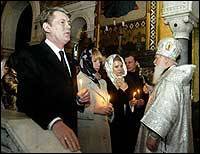 Patriarch Filaret
(Denysenko), head of the Ukrainian Orthodox Church-Kyivan Patriarchate (UOC-KP),
served a panakhyda (memorial service) for the souls of the victims of the
Ukrainian Holodomor (Stalin-engineered famine) of 1932 –3. The service took
place on 26 March 2005 in the Patriarchal Cathedral of St. Volodymyr, with the
participation of Ukrainian President Viktor Yushchenko, Prime Minister Yulia
Tymoshenko, and other government representatives.
Patriarch Filaret
(Denysenko), head of the Ukrainian Orthodox Church-Kyivan Patriarchate (UOC-KP),
served a panakhyda (memorial service) for the souls of the victims of the
Ukrainian Holodomor (Stalin-engineered famine) of 1932 –3. The service took
place on 26 March 2005 in the Patriarchal Cathedral of St. Volodymyr, with the
participation of Ukrainian President Viktor Yushchenko, Prime Minister Yulia
Tymoshenko, and other government representatives.
In an address to those
present, Patriarch Filaret said, among other things: “We lived in a time when a
great crime like the Holodomor, which took the lives of millions of Ukrainians,
was kept in silence. But today the Lord has put us in different conditions. We
not only have our independent Ukrainian state, but we also have real democracy,
which was chosen by the people with God's blessing during the Orange Revolution.
That's why today we are able not only to portray the history of Ukraine
accurately, but also to openly pray for our ancestors, fathers, mothers,
brothers and sisters killed by famine…”
According to a report by the
press service of the UOC–KP, the last time the victims of the Holodomor were
commemorated with participation from the highest Ukrainian government officials
was in 1993, when the 60th anniversary of the tragedy was marked with
participation of then-President Leonid Kravchuk.
RISU note:
“Holodomor” may be translated from Ukrainian as “deliberate famine.” The
term is used by those who consider that this was an artificial famine, a
deliberate genocide committed as part of Joseph Stalin's collectivization
program under the Soviet Union.
Sources: • http://www.uaorthodox.org./news.php?pid=519•
http://ww2.yuschenko.com.ua/ukr/present/News/2771/
•
http://en.wikipedia.org/wiki/Holodomor
Constantinople
Doesn't Recognize Kyiv Church as under Moscow, Says Ukrainian Orthodox USA
Archbishop
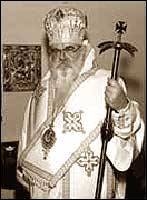 “The Moscow
Patriarchate consists of that territory which it encompassed to the year 1686.”
Archbishop Vsevolod (Majdanski) of the Ukrainian Orthodox Church of the USA (UOC
USA), a representative of the Ecumenical Patriarchate of Constantinople, told
this to Ukrainian President Viktor Yushchenko at a meeting on 24 March 2005. The
archbishop added that Kyiv's “subjugation” to the Russian Orthodox Church,
starting that year and continuing to the present, was not ratified by
Constantinople.
“The Moscow
Patriarchate consists of that territory which it encompassed to the year 1686.”
Archbishop Vsevolod (Majdanski) of the Ukrainian Orthodox Church of the USA (UOC
USA), a representative of the Ecumenical Patriarchate of Constantinople, told
this to Ukrainian President Viktor Yushchenko at a meeting on 24 March 2005. The
archbishop added that Kyiv's “subjugation” to the Russian Orthodox Church,
starting that year and continuing to the present, was not ratified by
Constantinople.
According to the press release of the Ukrainian
government, during his discussion with Archbishop Vsevolod, Yushchenko stressed
that his government will not directly involve itself in ecclesiastical matters.
“We stand for the equality of all churches,” the president said. The meeting
also centered on the necessity of developing harmonious interdenominational
relationships on the road to the establishment of a local Ukrainian Orthodox
Church. Archbishop Vsevolod expressed the good wishes of the Ecumenical
Patriarchate to both President Yushchenko and the Ukrainian nation.
During the meeting with the president, Archbishop Vsevolod made a
statement which, according to the UOC USA public relations office, reflects the
position of the Ecumenical Patriarchate of Constantinople: “The position of the
Mother Church, the Patriarchate of Constantinople, is that her daughter, the
Moscow Patriarchate, consists of that territory which it encompassed to the year
1686. The subjugation of the Kyivan Metropolitanate to the Moscow Patriarchate
was concluded by Patriarch Dionysius without the agreement or ratification of
the Holy and Sacred Synod of the Great Church of Christ (the Patriarchate of
Constantinople).”
During his recent visit to Ukraine, Archbishop
Vsevolod also met with Patriarch Filaret, head of the Ukrainian Orthodox
Church-Kyivan Patriarchate, Metropolitan Volodymyr, head of the Ukrainian
Orthodox Church–Moscow Patriarchate, and Archbishop Makarii of the Ukrainian
Autocephalous Orthodox Church (UAOC) in Lviv.
Another hierarch of the
UOC USA, Archbishop Antony of the church's eastern eparchy, also recently
traveled to Ukraine and met with Yushchenko.
On 11 March, Archbishop
Antony met with Yushchenko to discuss the continued ecclesiastical struggles in
Ukraine and sought the government's assistance in resolving the issues which
divide the church. The president expressed his deep desire to see a single,
united Ukrainian Orthodox Church in Ukraine and indicated that he will work
closely with all sides, in particular the Ecumenical Patriarchate of
Constantinople, to bring this unity about. The archbishop also invited the
president to visit South Bound Brook/Somerset, New Jersey, the Metropolitanate
Center of the UOC USA, during his upcoming working visit to President Bush in
Washington, D. C. President Yuschenko expressed a sincere desire to make that
visit.
Archbishop Antony also met with hierarchs of the UAOC,
Metropolitan Andrii of Ivano-Frankivsk and Archbishop Makarii of Lviv, and with
clergy who serve in the UAOC Patriarchate Office in Kyiv to discuss recent
developments in the life of the church.
Source: UOC USA office of public
relations • http://www.interfax-religion.ru/?act=news&div=2188
UOC-KP and
UOC-MP Orthodox Leaders Comment on Jurisdiction of Russian Orthodox Church
Metropolitan
Volodymyr (Sabodan), head of the Ukrainian Orthodox Church-Moscow Patriarchate
(UOC-MP), and Patriarch Filaret (Denysenko), head of the Ukrainian Orthodox
Church-Kyivan Patriarchate (UOC-MP), discussed the possibility of the UOC-MP
becoming independent of the jurisdiction of the Russian Orthodox Church. The
discussion was broadcast on TV Channel 5 in Kyiv on 27 March 2005. The text of
the broadcast follows.
[Presenter] We will now speak in more detail
about one of the most significant events of the week. Namely, the fact that the
possibility was raised of the Ukrainian Orthodox Church becoming independent
from the Moscow Patriarchate. This reportedly originated from the mouth of the
Ecumenical Patriarchate [of Constantinople].
The leading figures of the
Ukrainian Orthodox churches have reacted to the announcement of the Ecumenical
Patriarchate that the Kyiv Metropolitanate is not the canonical territory of the
Moscow Patriarchate: the announcement reportedly appeared in Constantinople this
week. However, Metropolitan Volodymyr of Kyiv and All-Ukraine has told Channel 5
that this was just talk and no decision has been taken. Meanwhile, the Kyiv
Patriarchate does not see grounds for refusing to acknowledge this announcement
from Constantinople.
[Metropolitan Volodymyr] This was a conversation at
the reception of two Constantinople bishops with our president. There was a
conversation recently, at which it was said that the Constantinople patriarch
[Bartholomew] had reportedly decided it, but it was not decided by the synod.
[Patriarch Filaret] There are no grounds for not believing these
announcements. This is not the first time that the Constantinople church has
announced that it recognizes the canonical territory of the Moscow Patriarchate
within the boundaries of 1686.
RISU note: Archbishop Vsevolod
(Majdanski) of the Ukrainian Orthodox Church of the USA (UOC USA), a
representative of the Ecumenical Patriarchate of Constantinople, met with
Ukrainian President Viktor Yushchenko on 24 March 2005. The archbishop
reportedlt told Yushchenko that, according to Constantinople, “The Moscow
Patriarchate consists of that territory which it encompassed to the year 1686.”
He added that Kyiv's “subjugation” to the Russian Orthodox Church, starting that
year and continuing to the present, was not ratified by Constantinople.
Sources and previous
RISU story: BBC Monitoring Service, UK, in English; Action Ukraine Report
• http://5tv.com.ua/newsline/184/0/5688/
•
http://www.risu.org.ua/eng/news/article;4953/
Orthodox Bible
study Course of Father Oleg Vedmedenko
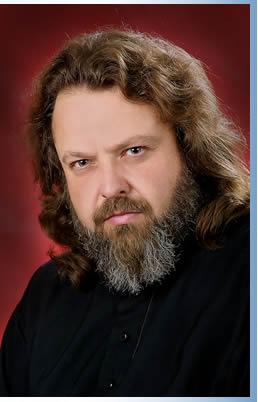 The bible study course of Father Oleg
Vedmedenko represents modern
theological school that continues traditions of Alexandrian-Cappadocian school:
Basil the Great, Gregory the Theologian, Gregory of Nyssa, Clement of
Alexandria, Origen and Panthen. It studies the worldview questions through the
prism of modern knowledge. To visit his web site CLICK
HERE>>>
The bible study course of Father Oleg
Vedmedenko represents modern
theological school that continues traditions of Alexandrian-Cappadocian school:
Basil the Great, Gregory the Theologian, Gregory of Nyssa, Clement of
Alexandria, Origen and Panthen. It studies the worldview questions through the
prism of modern knowledge. To visit his web site CLICK
HERE>>>
Report Shows
UOC-KP Largest Church in Ukraine
A resent report
by the East-West Church & Ministry Report shows that the UOC-KP is the
largest church in the Ukraine. The Report serves as a clearinghouse for
information relevant to the status of Christianity
and Western
ministry in the former Soviet Union and Central and Eastern Europe.
According to the
report 22 percent of the people responding to the Report survey, stated they
were members of the UOC-KP, as compared to only 12 percent for the UOC-MP. There
is a paradoxical situation in that the number of registered churches of the
Moscow Patriarchate is much larger than the number of churches of the Kyivan
Patriarchate, yet only 12 percent of the people identify themselves with the
Moscow Patriarchate, whereas 22 percent identify with the Kyivan Patriarchate.
To read the
entire report CLICK HERE>>>
Yushchenko Convinced Unified
Ukrainian Orthodox Church Possible
“I am certain
that we will live to see a unified Ukrainian Orthodox Church.” So said Ukrainian
President Viktor Yushchenko, 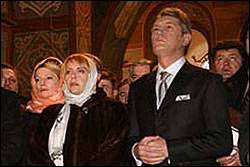 addressing the
delegates at a constituent assembly of the National Union of the Our Ukraine
Party on 5 March 2005.
addressing the
delegates at a constituent assembly of the National Union of the Our Ukraine
Party on 5 March 2005.
Yushchenko expressed his certainty that “we all
have every possibility to respect each other's feelings, regardless of the
church we attend… If we are friends with different confessions, if we respect
their feelings, we will find the answer [to the question of] how to live in
brotherhood, in mutual respect, without ignoring anybody's feelings,” the
president said.
Source: http://www.uaorthodox.org/news.php?pid=505
The Destiny of the Ukrainian
Orthodox Church at the Beginning of the 21st Century
According to
Yuriy Chernomorets, "The church is perserved by its public reputation or by
support on the part of government. In 2004 the UOC (Ukrainian Orthodox
Church-Muscow Patriarchare) lost both. It only remains to pray. However,
God may also 'issue a no-cofidence note' to modern Sadducess and Pharisess."
Chernomorets' article first appeared on the Internet site risu.org.ua. You can
read his entire article by CLICKING HERE>>>
"Save our wooden churches!"
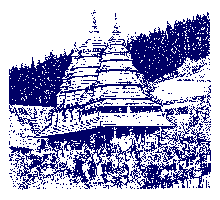 Transcarpathia
still has 118 wooden churches that were built over the past five centuries.
Forty-eight of them are registered as architectural monuments. By contrast,
Slovakia has only 27 wooden churches, but they all function normally and are
reliably protected by the state. In Transcarpathia dozens of wooden churches are
in deplorable condition. The area's cultural figures and journalists, who have
created the Cultural Brotherhood and New Form civic organizations, and
professors from the Uzhhorod College of Arts claim that the regional
authorities' campaign called “Save the Wooden Churches of Transcarpathia,” which
was launched three years ago, has boiled down to holding run-of-the-mill
concerts and failed to provide at least minimal protection for these holy
places. Activists are now drawing up a message urging President Yushchenko and
the new prime minister to adopt a government program to preserve and restore
hundreds of old wooden churches in the Ukrainian Carpathian region. To Read the entire article CLICK HERE.>>>
Transcarpathia
still has 118 wooden churches that were built over the past five centuries.
Forty-eight of them are registered as architectural monuments. By contrast,
Slovakia has only 27 wooden churches, but they all function normally and are
reliably protected by the state. In Transcarpathia dozens of wooden churches are
in deplorable condition. The area's cultural figures and journalists, who have
created the Cultural Brotherhood and New Form civic organizations, and
professors from the Uzhhorod College of Arts claim that the regional
authorities' campaign called “Save the Wooden Churches of Transcarpathia,” which
was launched three years ago, has boiled down to holding run-of-the-mill
concerts and failed to provide at least minimal protection for these holy
places. Activists are now drawing up a message urging President Yushchenko and
the new prime minister to adopt a government program to preserve and restore
hundreds of old wooden churches in the Ukrainian Carpathian region. To Read the entire article CLICK HERE.>>>
ERITREA ARRESTS SUNDAY
SCHOOL GROUP
Orthodox Church’s Medhane Alem ministry closed
down.
A group of Sunday
School teachers and their students were arrested last weekend in the Eritrean
capital of Asmara while holding classes in their church compound.
The 27
Christians, all members of the Medhane Alem Orthodox Church in Asmara, were
apprehended during their Christian instruction classes at the church compound on
Saturday morning, February 19.
Most of the
Sunday School students are young people, who together with their teachers remain
jailed at a local police station.
A Sunday School
ministry within the Eritrean Orthodox church, the Medhane Alem group has
normally been exempted from the Eritrean government's harsh crackdown against
evangelical Protestant churches.
However, Compass
has confirmed that in early February, the entire Medhane Alem ministry was
ordered closed down by government officials. No explanation has been given for
outlawing the movement.
In one previous
incident reported in March last year, a Medhane Alem meeting place in downtown
Asmara was sealed by police, with the group's lay leader detained for
investigations for one day. Reportedly the ordained Orthodox priest directing
the Sunday School ministry has been under police investigation during the past
year.
Religious groups
outside Eritrea's “official” four religions — Orthodox, Catholic, Lutheran and
Islam — were all ordered to close down in May 2002. The presidential decree made
all worship meetings illegal for about 13 independent Protestant denominations
as well as Jehovah's Witnesses and the Baha'is, even if the meetings are held in
private homes.
Over the past
three years, more than 400 Christian believers caught praying, studying the
Bible or worshipping outside the government-recognized church buildings have
been jailed and tortured. Some who refused to sign a promise to renounce their
faith have been incarcerated in metal shipping containers or underground cells.
Among them are
three prominent Protestant pastors who have been held incommunicado since May
2004 by the Eritrean government, which has refused to file charges against them
or bring them to court.
Last weekend's
arrests make a total of 214 Eritrean Christians who have been put under arrest
by police authorities in the past two months alone.
UOC–KP Orthodox Call Autocephalous
to Union, UOC-MP to Peace
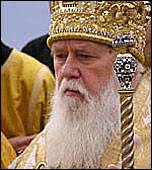 The Ukrainian Orthodox Church–Kyivan
Patriarchate (UOC–KP) is calling the Ukrainian Autocephalous Orthodox Church
(UAOC) to union and asking the Ukrainian Orthodox Church-Moscow Patriarchate
(UOC–MP) to start peaceful relations. Patriarch Filaret (Denysenko), head of the
UOC-KP, spoke about this at a press conference held in his residence on 23
February 2005.
The Ukrainian Orthodox Church–Kyivan
Patriarchate (UOC–KP) is calling the Ukrainian Autocephalous Orthodox Church
(UAOC) to union and asking the Ukrainian Orthodox Church-Moscow Patriarchate
(UOC–MP) to start peaceful relations. Patriarch Filaret (Denysenko), head of the
UOC-KP, spoke about this at a press conference held in his residence on 23
February 2005.
During the press conference, Patriarch Filaret spoke of
the results of a joint session of the Holy Synod and the Higher Church Council
of the UOC-KP which was held on 21-22 February 2005. Problems of the church's
ministry in society in the new political conditions, dialogue with other
Orthodox jurisdictions, and other current issues of the church's life were
discussed at the meeting.
The patriarch mentioned that two addresses
were approved at the joint session. One, addressed to the UAOC, suggested that
the two churches unite into a single National Ukrainian Orthodox Church. The
second, addressed to the UOC-MP, asked for an end to the discord that has
existed between the two churches from the old government to the present.
Patriarch Filaret also said that the UOC–MP should in future be known as
the “Russian Orthodox Church in Ukraine,” so that it does not have as deep a
political influence on Ukrainian society as it enjoys now.
The patriarch
also demanded that the UOC–KP be granted rights comparable with those of the
UOC–MP. In particular, he said that in regions where the UOC–KP has no church
buildings, “cult buildings not in use by other churches” should be transferred
to it.
Patriarch Filaret stressed that the UOC–KP supports the program
of the Ukrainian government, which “has proclaimed a moral rebirth of Ukraine.”
He also said that the church he heads will cooperate with the new government in
revitalizing spirituality. The patriarch identified one of the directions of
such cooperation in granting the church access to the media by opening a
specialized Orthodox TV or radio channel. In addition, the patriarch thinks
Christian morality should begin to be taught at schools. It is precisely this,
according to Filaret, that will preserve the Christian religion in Ukraine.
Patriarch Filaret also said at the press conference that he opposes the
recent liquidation of the National Committee on Religious Matters.
“This
is not the right time [to do this, because the religious situation in Ukraine
[…] does not at this stage allow liquidating a state organ. That is why we will
ask both the president and the prime minister to approach this issue in a
careful and balanced manner, so as not to harm the religious situation in
Ukraine,” Patriarch Filaret said.
He also spoke in favor of rebuilding
the historic Tithe Church in Kyiv. “We insist that the Tithe Church be rebuilt,
despite the fact that there are protests by certain forces in Ukraine.
“I remember the reaction of some forces, in Kyiv, and outside, to the
renewal of the Monastery of St. Michael and the Cathedral of the Dormition of
the Kyiv Monastery of the Caves,” said Patriarch Filaret. “Back then, they used
to say that it's better to see the real ruins of the monastery and the cathedral
rather than rebuilt churches, because these [rebuilt churches] are not 11th
century, but 20th century churches. But you can see that the meaning of
Michael's Monastery and the Cathedral of the Dormition, as well as other
churches that were rebuilt, [… is to bring] a positive contribution to the
spiritual rebirth. The so-called ‘orange revolution' was a result of these
churches being built.” The patriarch stressed that what happened on Kyiv's
Independence Square in November and December 2004 was a result of the spiritual
rebirth of Ukraine.
Therefore, according to the patriarch, the UOC–KP
approaches the renewal of the Tithe Church from the position of reviving
spirituality and thinks it necessary. “This, not the remains of the ruined
church, will promote spiritual rebirth,” Patriarch Filaret said. He also
stressed, that after its reconstruction, the Tithe Church should be transferred
to the UOC–KP as the National Ukrainian Orthodox Church.
Sources: • http://www.uaorthodox.org./news.php?pid=500
•
http://ukr.for-ua.com/news/2005/02/23/122630.html
Ukraine's
unreported Revolution- Viktor Yushchenko was swept to power by the forces of
religious freedom
"A LARGE PART of
what's at stake here is the future of Christianity in this part of the world,"
said Paul Marty, president of a Pennsylvania based NGO called HOPE
International, to the Mission Network News. "If the election goes toward the pro
Russian candidate," said Marty, who actually lives in Ukraine, "then a lot of
the policies of the country are going to follow. And, he's publicly stated that
the only church he would recognize would be the Russian Orthodox Church and he
would not tolerate others. "
In short, if Marty was right, what drew
hundreds of thousands of Ukrainians into the streets after the first crooked run
off vote between the two Viktors- pro Moscow prime minister Viktor Yanukovych
and pro Western former prime minister Viktor Yushchenko was not just outrage
over election fraud. It was desperation over the possible imminent suppression
of freedom of religion. To read the entire article which appeared in the
March 2005 issue of "The American Spectator" CLICK HERE>>>
St. Andrew's
Brotherhood adopts ORANGE as a signs of unity with Ukrainian Orthodox Church -
Kyivan Patriarchate.
According to the
Save Our Ukraine wen site (http://www.saveouruoc.com/ ), on Sunday February 6, 2005 nine
members of the Board of St. Andrew's Brotherhood took their oath of office at
St. Andrew's Memorial Church in So. Bound Brook, NJ.
Wearing colorful
orange scarves and orange neckties the nine members of the Board took their
solemn oath of office declaring, in the presence of God, to serve and uphold the
teachings and Commandments of God and to serve His Holy Ukrainian Orthodox
Church.
The rite of
induction was administered by Fr. Jurij Siwko but the most interesting part was
that the oath of office did NOT include any reference or fealty to UOC-USA or
its ruling hierarchs but only to the “Holy Ukrainian Orthodox Church”.
It seems to be a
very subtle but significant difference since St. Andrew's Brotherhood lately has
been extremely vocal in matters of UOC-USA unity with UOC-KP in Ukraine and the
formation of one, united national Church headquartered in Kyiv. This was evident
when the head of St. Andrew's Brotherhood, Mr. Ihor Sawon, introduced a
resolution unanimously approved at the 17 th Sobor, calling for spiritual unity
between UOC-USA and a united, canonical UOC-KP in Ukraine.
The Save Our
Ukrainian web site stated that they fully support St. Andrew's Brotherhood in
their efforts and wish them well in convincing the hierarchs of UOC-USA that our
Mother Church is headquartered in Kyiv and NOT in Istanbul. source: http://www.saveouruoc.com/
The Diaspora's
Future
By Bishop Paul Peter Jesep
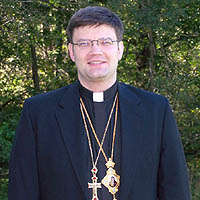 The Ukrainian Diaspora must be reborn or at least reformed. If there
is any doubt of the need then look no further than the recent controversy
regarding a high profile Ukrainian-American activist. He marginalized the
horror, travesty and enormity of the Holocaust by writing that “big money”
drives the “industry.”
The Ukrainian Diaspora must be reborn or at least reformed. If there
is any doubt of the need then look no further than the recent controversy
regarding a high profile Ukrainian-American activist. He marginalized the
horror, travesty and enormity of the Holocaust by writing that “big money”
drives the “industry.”
The Kyiv Post
called the remarks “stupid.” That was charitable. The activist also has penned
that Jews are partly responsible for the crimes committed under Communism. As
the newspaper rightly pointed out Jews should not be held accountable any more
than Georgians. Joseph Stalin was a Georgian. Yet no thinking, rational person
would blame Georgians for the atrocities of Stalin. The newspaper urged the
Diaspora to find suitable representatives that do not offer crude, shockingly
ignorant and inflammatory comments that divide the family of humankind. The Kyiv
Post offered a blunt, honest and accurate assessment.
The activist
went with Secretary of State Colin Powell to President Viktor Yushchenko's
inaugural. The Bush Administration, red faced with embarrassment after learning
of the activist's views, later commented that had they known of such positions
he would not have been invited to accompany Secretary Powell.
Independent of
the embarrassment that many Ukrainians feel as a community regarding the
controversy, there is a larger, more important issue that transcends the asinine
outlook of one person that unfortunately tars the entire Ukrainian-American
Diaspora community.
How should the
Diaspora present itself to the world? The activist referenced above is not the
face of the American Diaspora, though there is an unfortunate perception he
represents it due to notoriety. The other question raised is the role of the
worldwide Diaspora in a post-Soviet era. Either the Diaspora revisits its
mission and embraces a changing world or it will be ignored.
There must be
leadership from a new generation. In the past, I've penned that the Diaspora
must be better equipped at getting out a coherent, sustained message to the
Western media as to what it means to be Ukrainian. The Western media still
portray Ukraine as some kind of historical aberration of greater Russia. The
Diaspora needs a marketing infrastructure with qualified personnel. This
requires sophisticated leaders who think outside the box.
In addition,
while the Diaspora was very successful in pressing Western governments years ago
to address human rights abuses during the Soviet era while maintaining the
vibrancy of a non-Russified culture, it has fallen at the cross roads unsure of
the direction to take. This underscores the reason why another generation must
step forward to guide the worldwide Diaspora in various Western nations.
In another
editorial in the Kyiv Post, Jen Sunden the publisher said, “At present, no
Diaspora organization is playing an important role in Ukraine.” He's right. The
Diaspora is stuck in a pre-Soviet, anti-Communist mindset that does not lend
itself to realities of the present day.
No one, but
for the Communists, should be afraid of reform. Change is part of life. In the
corporate world, businesses must develop new services and products to stay
competitive. An individual must grow spiritually, however broadly one wishes to
define it, or he or she loses a part of their humanity. So too must Diaspora
organizations be overhauled if they are to be relevant.
As Sunden
pointed out, the worldwide Diaspora is composed of many affluent, highly
educated individuals who have maintained some type of cultural connection to
their ancestral Motherland. It has significant potential to be enormously
helpful in today's Ukraine.
There are many
challenges that Ukraine faces that the Diaspora can better address in a positive
manner ranging from combating AIDs, fighting anti-Semitism, orchestrating a
strategy to end homelessness, fostering a free and independent media, and
encouraging civil liberties for all citizens no matter their background. This is
not to suggest that such issues aren't already a concern to some Diaspora
Ukrainians. Yet there is no identifiable, coherent strategy to assist on such
social and cultural issues because the focus still remains on the past.
It is naive to
believe that President Putin or Kremlin bureaucrats have given up on exploiting
or influencing Ukraine. Hence, it is pragmatic to remain watchful regarding the
Russian government's motives and for the Diaspora to be ready to offer a
measured, appropriate political response if merited. Its focus, however, must
remain on Ukraine's new beginning with both the challenges and many wonderful
opportunities ahead.
The Soviet
Union is dead. There is a new world order. Let the Diaspora's political activism
begin anew.
Hopefully,
this commentary along with the others that have come before it, will encourage
ongoing dialogue about the urgent need for fresh leadership and the shifting of
Diaspora economic, political and intellectual resources. It's possible that many
of the current Diaspora organizations and those identified as leaders are unable
to meet the challenges of a post-Soviet, post-Kuchma Ukraine. If that is the
case, then it's time to consider starting new organizations leaving the old ones
to implode from their own irrelevance.
Bishop
Paul Peter Jesep is Chancellor of the Archeparchy, Vicar General of Public
Affairs and Government Relations and Episcopal Vicar of Colombia and Venezuela
in the Ukrainian Autocephalous Orthodox Church Sobornopravna of North and South
America. His Grace, a lawyer and political scientist by training, has studied at
Bangor Theological Seminary (bts.edu), the third oldest such school in the
United States. He is also a former aide to U.S. Senator Susan Collins (R-ME).
The views expressed here are strictly personal. His Grace may be reached at
VladykaPaulPeter(a)aol.com.
source: http://www.brama.com/news/press/2005/02/050211bishoppaulpeterjesep_diaspora.html
UOC-KP Orthodox Hierarch in
Khmelnytsk Hopes New Government will Resolve Property Issues
For more than
three years, the Regional Administration for Religious Matters in western
Ukrainian Khmelnytskyi has been blocking the transfer of a church in the
Medzhybizh National Reserve in the Letychiv district to the community of the
Ukrainian Orthodox Church–Kyivan Patriarchate (UOC–KP), said Archbishop Antonii
(Makhota) of Khmelnytskyi and Kamianetsk-Podilskyi of the UOC–KP. The hierarch
hopes that the appointment of a new head of the Khmelnytskyi Regional
Administration will change the situation with the church. RISU's
Ukrainian-language site posted the news on 8 February 2005.
According to
Archbishop Antonii, this behavior from the Regional Administration for Religious
Matters can be explained by the fact that the village of Medzhybizh is the
native village of Metropolitan Volodymyr (Sabodan), head of the Ukrainian
Orthodox Church–Moscow Patriarchate (UOC–MP). The church in question was
officially given to the Roman Catholic community in 1992 by Mr. Huselnykov, the
president's representative in the region. In 2004, in an official letter Bishop
Leon Dubrawski, the local Roman Catholic ordinary, gave up the church for the
benefit of the Khmelnytskyi eparchy of the UOC–KP.
The fact that the
church has not been given to the UOC–KP is, according to Archbishop Antonii,
connected with the fact that “Metropolitan Volodymyr Sabodan, using his
influence, is trying to prevent a positive resolution of the issue, despite the
fact that Moscow Patriarchate faithful have their own church in Medzhybizh.”
Archbishop Antonii informed RISU that the UOC–KP eparchy of Khmelnytskyi
has received many reports that the heads of several district administrations
have refused to give land for building new churches. “We have such reports from
the villages of Yarmolyntsi, Vinkivtsi, Derazhnia, Iziaslavskyi, and
Krasylivskyi. Whenever the issue was under discussion in meetings, state
officials ridiculed the clergy, saying that there is no, nor can there be, any
Kyivan Patriarchate [presence] in districts where the Moscow Patriarchate
dominates,” said the archbishop.
The archbishop said that nothing should
now get in the way of the administration's undertaking measures to carry out the
decree “On Urgent Measures for Combating the Negative Consequences of
Totalitarian Policies of the Former Soviet Union regarding Religion and
Restoration of the Violated Rights of Churches and Religious Organizations.”
This decree was issued by former Ukrainian President Leonid Kuchma in March
2002. Archbishop Antonii asks for an end to the era of the Ukrainian government
dividing religious organization into “its own” (the UOC–MP) and “outcasts” (the
UOC– KP, the Roman and Ukrainian Greek Catholic churches, and others).
The archbishop expressed his hope that the government's attitude to the
needs of UOC-KP faithful will improve with the appointment of Vitalii Oluiko as
the new head of the Khmelnytskyi Regional Administration. source: http://www.risu.org.ua/eng/news/article;4590/
Ukrainian Orthodox
leader raps Russian influence
Patriarch Filaret
of Kiev, the leader of one of three 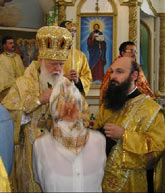 separate groups
competing for the allegiance of the Orthodox faithful in Ukraine, has called for
unification of the nation's Orthodox churches. At the same time, Patriarch
Filaret has praised laymen of another Orthodox congregation who protested their
leaders' involvement in the country's recent presidential contest.
separate groups
competing for the allegiance of the Orthodox faithful in Ukraine, has called for
unification of the nation's Orthodox churches. At the same time, Patriarch
Filaret has praised laymen of another Orthodox congregation who protested their
leaders' involvement in the country's recent presidential contest.
Patriarch Filaret
was once the acknowledged leader of the Ukrainian Orthodox community, in union
with the Russian Orthodox patriarchate of Moscow. But when his demands for
autonomy provoked a hostile reaction from Moscow, Filaret broke with the Russian
patriarchate to establish an independent Orthodox patriarchate of Kiev. The
Ukrainian Orthodox- Kiev Patriarchate (UOC-KP) now competes with the Ukrainian
Orthodox Church that remains attached to the Moscow patriarchate (UOC-MP). A
third, smaller group, the Autocephalous Orthodox Church of Ukraine, also seeks
to represent the country's Orthodox faithful.
During the 2004
Ukrainian presidential campaign, the UOC-MP leaned heavily toward Viktor
Yanukovich, prompting some Orthodox laymen to complain that their UOC-MP leaders
had allowed partisan politics to corrupt the faith. Patriarch Filaret praised
those laymen, saying that they "stood up as one for their constitutional rights,
including the right to free and fair presidential elections and democracy.”
The UOC-KP leader
showed his own hand by welcoming the election of Viktor Yushchenko, saying that
the election had been "a triumph of good over evil." Through the Yushchenko
victory, he said, "we have gained the right to democracy and freedom, to
spiritual self-expression."
In yet another
slap at the UOC-MP leaders and their allies in Russia, Patriarch Filaret
complained that "voices are being heard from the east" that threaten the unity
of democratic Ukraine; he insisted that these "unhealthy forces" must not
prevail.
“Thanks to the
imperial thinking of the so-called Third Rome [Moscow], Ukrainian Orthodoxy
remains divided," the Ukrainian prelate said. He urged the Orthodox people of
Ukraine to put aside those divisions, and unite in "a single national Ukrainian
Orthodox Church." source;
http://www.cwnews.com/news/viewstory.cfm?recnum=34801
A Place in the Hierarchy—
Or why the Moscow Patriarchate is holding onto Ukrainian Orthodoxy
By Klara
GUDZYK, The Day, #1, Tuesday, 18 January 2005
During the
presidential campaign in Kyiv, Ecumenical Patriarch Bartholomew I, Archbishop of
Constantinople, addressed two friendly messages to the Ukrainian people,
expressing his support and approval of the democratic process in Ukraine. In his
second message the Patriarch greeted the Ukrainian people and Viktor Yushchenko
on the election victory (after the announcement of the preliminary turnout).
These messages may be described as yet another manifestation of the
tectonic shifts caused by the extraordinary events that took place during the
presidential campaign, which were totally unexpected for the rest of the world
(frankly speaking, also for most Ukrainians). Also, it was an extraordinary move
on the part of the Ecumenical Patriarch, as his office had never publicly
demonstrated such attention to Ukrainian affairs, even less so in the secular
domain. For Ukrainian Orthodox adherents, the Ecumenical Patriarch remains a
distant, even abstract, entity, mostly having to do with the history of Kyivan
Rus' (official religious contacts with the Patriarch of Constantinople were
terminated after the Kyiv See was subordinated to the Moscow Patriarchate in
1686), although Leonid Kuchma's administration tried through diplomatic channels
to get Bartholomew I involved in solving Ukrainian Orthodox problems.
Another very important fact is that in his second message Patriarch
Bartholomew I offered to help settle the schism in the Ukrainian Orthodox
Church. Not surprisingly, his messages triggered an immediate response from the
Moscow Patriarchate. The office of external church contacts sharply denounced
the Ecumenical Patriarch's initiative as the first step in the direction of
“redividing” the Orthodox world, specifically by excluding the Moscow
Patriarchate-affiliated UOC from the Russian Orthodox Church and subordinating
Ukrainian Orthodoxy to the Constantinople See. Such intentions must seem obvious
to Moscow, especially considering the fact that the Constantinople See issued an
official statement in the 1920s, which recognized the canonical territory of the
Moscow Patriarchate only within the boundaries that were established in 1589,
when the patriarchate was established; in other words, without the Ukrainian
Church.
The Moscow Patriarchate's instant response was only natural,
because the point at issue is its supremacy in the Orthodox world, a matter of
the highest priority. This supremacy is now mainly determined by the size of the
church and the number of adherents, religious communities, temples, monasteries,
and convents. The Russian Church remains the largest in the Orthodox world and
it is resolved to maintain its lead and play a decisive role (in this it has
always been supported by the secular authorities ranging from princes to tsars
to Bolsheviks to the current Russian government). However, according to the
historical canon, the Ecumenical Patriarch occupies first place in the Orthodox
hierarchy and the Patriarch of Moscow, fifth.
How would the ROC's status
change if the Ukrainian Orthodox adherents withdrew? The answer is radical and
spells disaster. At present, 10,000 UOC-MP parishes (Moscow-affiliated religious
communities in Ukraine) make up slightly less than one-half of the Russian
Church. Therefore, by losing these religious communities, the ROC would actually
lose its status as the world's largest Orthodox Church. Dear Reader, guess which
church would then be the largest? Correct. The Ukrainian Orthodox Church,
provided it is undivided, sound, and solid. It would have almost 15,000
communities, considerably more than in Russia.
The ROC's main advantage
in the Orthodox world is its size, and thus it completely depends on the UOC-MP
membership. It is not so much a matter of revenues, not even political influence
in Ukraine (as vividly demonstrated by the presidential campaign), as the
prospect of losing international prestige and having to climb down one rung on
the hierarchical ladder. That is why both the Russian Church and Russian
government are holding fast and paying such close attention to the UOC-MP.
From the statement issued by the office of the Moscow Patriarchate's
external church contacts it follows that Moscow's ecclesiastical diplomats feel
certain that Patriarch Bartholomew I intends to include the Ukrainian Church in
his sphere of influence, even place it under his jurisdiction — in other words,
restore the status of the Kyiv See as it was in Kyivan Rus'. Such assumptions,
it should be noted, are provoked not only by the Moscow Patriarchate's
suspicions, but also by the fact that in his message Patriarch Bartholomew I
mentions Ukraine's one painful problem, namely the church schism, but makes no
mention of another, equally important, issue: granting the Ukrainian Orthodox
Church autocephalous status, meaning complete independence. Here one ought to
compare the size of the Ecumenical Patriarchate (some 3,000 parishes scattered
throughout the world) to that of the Ukrainian Orthodox community (about 15,000
parishes). Also, the size and influence of the Church of Constantinople, once
the de facto ruler of the entire Orthodox world, disastrously declined after the
fall of Constantinople in 1453.
Assuming that the Ecumenical
Patriarchate harbors such intentions (most likely they exist in the feverish
imagination [of the Moscow Patriarchate]), they are not to the liking of both
Moscow and Kyiv. Be that as it may, admitting a church to the world Orthodox
community involves complicated and time-consuming procedures (even when they
have the support of the Ecumenical Patriarch). For example, the Hellenic
Orthodox Church of Greece remained unrecognized for several decades after that
country became independent; the Moscow bishopric that withdrew from the Kyiv See
had no legal status for almost 140 years, until the proclamation of the Moscow
Patriarchate.
Apparently the presidential campaign in Ukraine also
caused reverberations within church circles, and not only in conjunction with
the Ecumenical Patriarch. There is hardly any doubt that recent events did
little to introduce positive changes to the status and image of the Ukrainian
Orthodox Church under the Moscow Patriarchate in the public eye. Quite a few
parishioners and clergymen did not hold with the overactive campaign policy of
their church, and some even voiced their disagreement (things like that happen
very seldom in a church community). This, however, does not mean that the
situation may change radically and quickly in this church, or that it will
noticeably distance itself from the Moscow Patriarchate, or that part of the
clergy will revise their attitude to the challenges of Ukrainian statehood.
Nevertheless, it is safe to assume that the UOC-MP policy will
eventually change, even if gradually, because the days when bishops and parish
priests felt free to act as they pleased in regard to many issues of national
importance are now gone. This author believes that the most outspoken
pro-Russian bishops will be quietly relieved of their posts, and the so-called
Orthodox brotherhoods, etc., will be called to account. Also, the Ukrainian
Church may finally remember that the divine services are celebrated in the Greek
churches in Greek, in the Georgian ones in Georgian, and in the Orthodox
churches of Western Europe in the languages spoken by the parishioners.
And, finally, we are very grateful to Ecumenical Patriarch Bartholomew
I.
• http://www.day.kiev.ua/130700/
RESPONSE
TO ARCHBISHOP BARTHOLOMEW'S REMARKS ON UKRAINE
The Ukrainian
Autocephalous Orthodox Church of North and South America Sobornopravna (UAOC-S)
welcomes Archbishop Bartholomew's call for unity among the Orthodox so long as
the "spiritual sovereignty" and "cultural integrity" of Ukraine is respected.
Recently the Greek prelate sent a congratulatory letter to President-elect
Viktor Yushchenko while calling disunity among the Orthodox "unacceptable." He
alluded to the growing friction between the Russian and Ukrainian Orthodox
Churches. Ukrainian Orthodoxy has increasingly rejected foreign control.
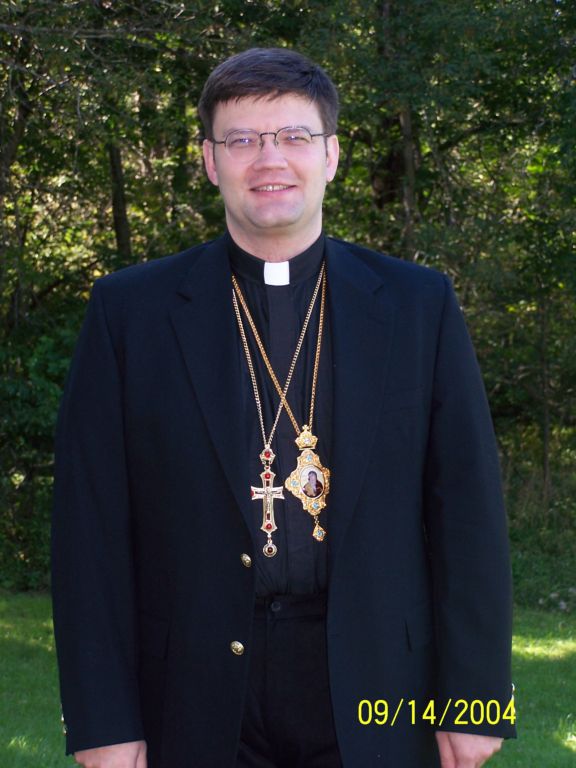 Bishop Paul
Peter Jesep, Vicar General of Government Relations and Public Affairs for the
UAOC-S, said "His Holiness Patriarch Filaret of the Ukrainian Orthodox Church
Kyiv Patriarchate, leader of over 30 million worldwide, has been working
tirelessly to bring the faithful together. Within Ukraine there will be unity
and harmony some day due to the leadership of Our chief shepherd, Patriarch
Filaret who is strengthening a national spiritual identity."
Bishop Paul
Peter Jesep, Vicar General of Government Relations and Public Affairs for the
UAOC-S, said "His Holiness Patriarch Filaret of the Ukrainian Orthodox Church
Kyiv Patriarchate, leader of over 30 million worldwide, has been working
tirelessly to bring the faithful together. Within Ukraine there will be unity
and harmony some day due to the leadership of Our chief shepherd, Patriarch
Filaret who is strengthening a national spiritual identity."
Bishop
Jesep said, "Archbishop Bartholomew no doubt appreciates that church unity, or
at least harmony, can exist if ecclesiastical politics is kept in check. All it
takes is a sincere respect for the sovereignty of Europe's second largest nation
-- not just on governmental matters, but on spiritual ones as well. That does
not exist now. "
He added, "Today a free people have the choice to
determine their political destiny as well as their spiritual fate. Ukraine has
spoken loudly on both matters."
“Ultimately,” Bishop Jesep added,
“whether an organization considers a branch of the Ukrainian Orthodox Church,
especially the Kyiv Patriarchate of 30 million, ‘canonical' is irrelevant. The
Ukrainian faithful, including our brothers and sisters in the Byzantine (Greek)
Catholic Church, need not ask anyone's permission on how best to walk with God.”
According to Bishop Jesep, “If Archbishop Bartholomew seeks harmony in
the Orthodox family then he must underscore to other branches, especially the
Moscow Patriarchate, that Ukraine's spiritual sovereignty, cultural integrity
and emerging national consciousness deserves respect.” source: http://www.uaoc.org
Faith A Concern of
Tymoshenko, Ukraine's New Prime Minister
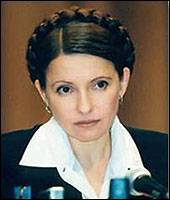 Kyiv– Yulia
Tymoshenko, who was confirmed as Ukraine's new prime minister by the country's
Parliament on 4 February 2005, has presented a program for government action,
the first chapter of which is called “Faith.” According to Tymoshenko, above
all, real faith in God must be restored in society.
Kyiv– Yulia
Tymoshenko, who was confirmed as Ukraine's new prime minister by the country's
Parliament on 4 February 2005, has presented a program for government action,
the first chapter of which is called “Faith.” According to Tymoshenko, above
all, real faith in God must be restored in society.
Tymoshenko stressed
that the status of spiritual education should be revised and given state
recognition “so that it becomes equal to other [kinds of] education… Ukraine
will never rise from its knees until it kneels before God.”
Tymoshenko
also stressed faith in one's country. “The government is to provide living
standards to be envied by the world's wealthiest countries,” Tymoshenko said.
According to her, a faith in him- or herself has to be awakened in every person.
“The Cabinet of Ministers will arrange constructive cooperation between
the state and religious organizations and the absolute upholding of the
principle of the separation of state and church,” Tymoshenko's program reads.
The program also promises that the state will create “equal conditions
for the activities of [all] religious organizations.”
Ukraine's
Parliament supported Tymoshenko's candidacy, voting 373 in favor.
UOC–KP Orthodox Head Awards
Former Attorney General
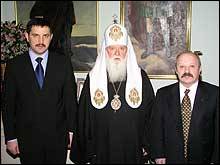 Kyiv – The
former acting attorney general of Ukraine, Professor Oleh Lytvak, was awarded
the Order of Saint Prince Volodymyr of the Ukrainian Orthodox Church–Kyivan
Patriarchate (UOC – KP) on 2 February 2005 at the residence of Patriarch Filaret
(Denysenko), head of the UOC-KP. Vasyl Smitiukh, attorney of the Sviatoshyn
district of Kyiv, was also awarded the high order. The men were awarded for
their contribution to the development of church-state relations, support for the
creation of a single national Ukrainian Orthodox Church, and for strengthening
the principles of the morality of the law in society.
Kyiv – The
former acting attorney general of Ukraine, Professor Oleh Lytvak, was awarded
the Order of Saint Prince Volodymyr of the Ukrainian Orthodox Church–Kyivan
Patriarchate (UOC – KP) on 2 February 2005 at the residence of Patriarch Filaret
(Denysenko), head of the UOC-KP. Vasyl Smitiukh, attorney of the Sviatoshyn
district of Kyiv, was also awarded the high order. The men were awarded for
their contribution to the development of church-state relations, support for the
creation of a single national Ukrainian Orthodox Church, and for strengthening
the principles of the morality of the law in society.
Lytvak was one of
the first people during the “Orange Revolution” to give a legal evaluation to
the election fraud and to stand on the side of those protesting in defense of
their rights.
Smitiukh was the only active procurator in Ukraine to sign
the address of the staff of the Ukrainian Procurators Office protesting the
methods Attorney General Hennadii Vasyliev used to run the structure.
Christian Leaders Bless New
President
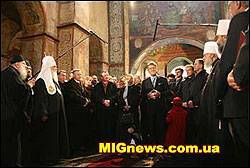 Kyiv– President Viktor Yushchenko started his first day
in office with a meeting with the leaders of all the Christian churches in
Ukraine, which took place on 24 January 2005 in Kyiv's Cathedral of St. Sophia.
The clergy congratulated the newly-inaugurated president and conferred their
blessings upon him. Yushchenko said, in turn, that his team will always lend an
ear to advice from the clergy and is counting on pastoral support.
Kyiv– President Viktor Yushchenko started his first day
in office with a meeting with the leaders of all the Christian churches in
Ukraine, which took place on 24 January 2005 in Kyiv's Cathedral of St. Sophia.
The clergy congratulated the newly-inaugurated president and conferred their
blessings upon him. Yushchenko said, in turn, that his team will always lend an
ear to advice from the clergy and is counting on pastoral support.
In
his congratulatory address, Patriarch Filaret (Denysenko), head of the Ukrainian
Orthodox Church–Kyivan Patriarchate, stressed that his church has remained with
the people and prayed for honest elections and the prayers have been answered,
for the Lord chose Viktor Yushchenko to serve Ukraine even before the people
chose him. The hierarch is certain that God ensured the success of the orange
revolution, which made the world discover Ukraine and put a start to a free and
democratic country. The patriarch assured the new president of his prayerful
support and expressed his certainty that under this presidency “the Ukrainian
people will feel the spirit of democracy and freedom, and spiritual values will
be at the forefront.”
Metropolitan Volodymyr (Sabodan), head of the
Ukrainian Orthodox Church–Moscow Patriarchate, wished that the president always
remember the popular wisdom “Not even to the threshold without God” (i. e. Do
not start anything without God), and that the Lord may help him in his every
act, renew his spirit and physical strength, so that he may serve the people,
the church and Ukraine rightly and in dignity.
Cardinal Lubomyr Husar,
head of the Ukrainian Greek Catholic Church, deemed it a miracle that “now the
Ukrainian people have awoken and shown that they are God's people, who want
justice…The Lord has entrusted you, through elections, with leading the
Ukrainian people into the future. The church in Ukraine assures you that it will
support you with its prayer. Count on this spiritual force. We will be with you
so that you can carry out your task,” the cardinal assured the new president.
Metropolitan Mefodii (Kudriakov), head of the Ukrainian Autocephalous
Orthodox Church, also assured the president of his church's prayerful support.
“We will pray and ask God to strengthen your spirit and bodily health, so that
your work for the good of the people is fruitful, consolidates the people and
unites divided Orthodoxy into a single national Orthodox Church…Your destiny is
to build the holy Ukrainian state, and you have no right to refuse the cross the
Lord has put upon your shoulders, because the people entrusted you with this and
they love you,” the metropolitan stressed.
Cardinal Marian Jaworski,
head of the Conference of Roman Catholic Bishops in Ukraine, called Yushchenko
“to serve others and carry out your calling with dignity, which is only possible
with God's blessing.”
Hryhorii Komendant, head of the All-Ukraine Union
of the Association of Evangelical Baptists, is certain that “the Lord chose
Viktor Yushchenko because Ukraine has prayed for hundreds of years, and now the
prayer has been heard.”
Mykhailo Panochko, bishop and head of the
All-Ukraine Union of Christians of the Evangelical-Faith Pentecostals, said that
it is impossible to govern a country without God and the Bible, which Viktor
Yushchenko's predecessors did not take into account. Panochko expressed
certainty that the newly elected president has been given “a massive credit of
trust and love from the people.”
Volodymyr Krupskyi, president of the
Ukrainian Union Conference of the Church of Seventh-day Adventists, wished the
new president “Solomon's wisdom, to develop the spirituality and freedom of the
person and to be a protector of religious minorities.”
Leonid Padun,
senior bishop of the Ukrainian Christian Evangelical Church, assured “that his
community is ready to work for the good of Ukraine.”
Bishop Viacheslav
Horpynchuk, head of the Ukrainian Lutheran Church, assured of his church's
prayer for the prosperity of Ukraine and called Yushchenko's team to keep
spiritual and human values.
All the representatives of the Christian
churches of Ukraine blessed the new president and assured him of their prayerful
support of his work.
Shevchenko
Church Re-consecrated in Kyiv
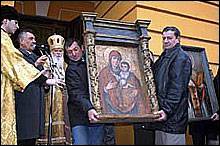 Kyiv – The
once-destroyed Church of the Nativity of Christ on Kyiv's Postal Square, famous
as the site of the funeral services for renowned Ukrainian poet and artist Taras
Shevchenko in 1861, has been rebuilt. It was re-consecrated on 14 January 2005
by Patriarch Filaret (Denysenko), head of the Ukrainian Orthodox Church-Kyivan
Patriarchate. Viktor Yushchenko, Ukraine's president elect, Kyiv Mayor Oleksandr
Omelchenko, and National Deputy Ivan Pliushch participated in the festive
ceremony.
Kyiv – The
once-destroyed Church of the Nativity of Christ on Kyiv's Postal Square, famous
as the site of the funeral services for renowned Ukrainian poet and artist Taras
Shevchenko in 1861, has been rebuilt. It was re-consecrated on 14 January 2005
by Patriarch Filaret (Denysenko), head of the Ukrainian Orthodox Church-Kyivan
Patriarchate. Viktor Yushchenko, Ukraine's president elect, Kyiv Mayor Oleksandr
Omelchenko, and National Deputy Ivan Pliushch participated in the festive
ceremony.
Yushchenko said in his speech that “today, Ukrainians should
not only speak of unity within the borders of the country, but of unity in
spirit, history and values.” Mentioning the history of the Church of the
Nativity of Christ, he said that “there were attempts to erase this page of
history, as many others, from our memory. But that which is not preserved cannot
become history.”
At the end of his speech, Yushchenko thanked all who
were involved with the church's renovation, and presented the church with three
ancient icons.
The first mention of the Church of the Nativity of Christ
in Kyiv dates back to 1520. It was rebuilt after a fire in 1717, with funds from
Mayor Roman Tykhonovych. The construction of a new church in the same place
began in 1744, with the old one continuing to function as part of the new one
for almost 40 years. However, this church, too, was ruined by fire. Construction
of a new classical church began in 1809, following the project of architect
Andrii Milenskyi. The church was painted in 1814, after which it was active for
over a hundred years, until it was demolished in 1935 because it was in way of
constructing a government center on Michael's Hill.
Source: • http://www.umoloda.kiev.ua/number/347/116/12539/
Patriarch
Petros VII of Alexandria and All Africa Killed in Helicopter Crash
Word that His
Beatitude, Patriarch Petros VII of Alexandria and All Africa was one of
seventeen persons killed in a helicopter crash en route to Mount Athos was
received on Saturday, September 11, 2004.
The 55-year-old
Patriarch was due to arrive on Mount Athos at 11:00 a.m. Saturday morning,
marking his first official visit to the 1000-year-old monastic enclave.
According to Greek Defense Ministry and various media reports, the helicopter
was reported missing about two hours after it left Athens. Officials confirmed
that bodies found by rescue crews some 20 miles off the Mount Athos coast in
Chalkidiki were those of Patriarch Petros and his companions.
Reports coming
out of Thessaloniki confirmed that, in addition to Patriarch Petros, those who
perished included His Eminence, Metropolitan Ireneos of Pilousiou; His Eminence,
Metropolitan Chrysostomos of Carthage; His Grace, Bishop Nektarios of
Madagascar; Archimandrites Arsenios and Kallistratos [Economou]; and Deacon
Nektarios Kontogiorgos. The Patriarch's legal, technical, and press advisors
were also among the dead, as were the Patriarch's brother and personal guard.
Five crew members lost their lives in the crash.
A Greek Army
spokesman reported that visibility was good and that the downed Chinook
helicopter was only about one-and-one-half years old.
According to
tradition, the Patriarchate of Alexandria was established by Saint Mark the
Evangelist in 42 A.D. Patriarch Petros, a native of Cyprus, was elected as the
115th Patriarch of Alexandria in 1997. His tenure was marked by renewed
missionary efforts in Kenya, Uganda, Madagascar, Cameroon, and elsewhere across
the African continent.
"May their
memory be eternal!"
UOC-KP Orthodox Exarch in Greece Passes Away
Metropolitan
Tymofii (Kutalianos) of Korsun (Keratsyn and Salamin),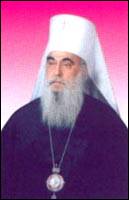 the patriarchal
exarch of the Ukrainian Orthodox Church-Kyivan Patriarchate (UOC-KP) in Greece,
passed away on 31 July 2004. The metropolitan was appointed by the Synod on 15
March 1996.
the patriarchal
exarch of the Ukrainian Orthodox Church-Kyivan Patriarchate (UOC-KP) in Greece,
passed away on 31 July 2004. The metropolitan was appointed by the Synod on 15
March 1996.
Patriarch Filaret, head of the UOC-KP, forwarded a telegram
of condolences to the faithful in Greece in which he wrote: “Our church lost a
faithful son who sincerely witnessed about the Kyivan Patriarchate in Greece and
devoted himself to the task of recognition thereof by the Hellenic sister
church.”
According to a decree of Patriarch Filaret, Archimandrite
Nektarii, the protosyncellus (chancellor) of the patriarchal exarchate in
Greece, is to serve as acting head.
Source:
www.kievpatr.org.ua
New
UOC-KP Orthodox Bishop Ordained
On 28 July 2004,
according to a decision of the Holy Synod of the Ukrainian Orthodox
Church-Kyivan Patriarchate (UOC-KP), Archimandrite Feodosii (Paikush) was
ordained bishop of Chernihiv and Nizhyn in St. Volodymyr’s Cathedral in Kyiv.
Patriarch Filaret (Denysenko), head of the UOC-KP, performed the
ordination together with bishops of the UOC-KP. Patriarch Filaret addressed the
new bishop: “After you received secular education and graduated from the
seminary, you worked in God’s vineyard for more than thirteen years. At a mature
age, you took monastic vows and worked fruitfully as a pastor in the Chernihiv
eparchy. Now, through the election of the Holy Synod and Chernihiv clergy, the
Lord calls you to a higher ministry as bishop… A bishop can do much good for the
church if he has in his soul the constant fear of the Lord and awareness of his
responsibility.”
Source: www.kievpatr.org.ua
UOC-KP Orthodox Honor Parliamentarian
The Ukrainian
Orthodox Church-Kyivan Patriarchate (UOC-KP) conferred the Order of Saint
Michael the Archangel upon Leonid Chernovetskyi, a national deputy and candidate
for president of Ukraine. UNIAN was informed about the award on 2 August 2004 by
Chernovetskyi’s press secretary, Kateryna Shapoval.
In his decree,
Patriarch Filaret (Denysenko), head of the UOC-KP, said that Chernovetskyi was
awarded “for services with regard to the revival of spirituality in Ukraine and
establishment of the National Ukrainian Orthodox Church.”
The
announcement notes that Chernovetskyi is the author of the law “On the
protection of public morals” and is a patron of the Stefania Christian
rehabilitation center, where thousands of homeless and poor people receive food
and medical aid.
Source: www.unian.net
Archbishop Vsevolod (Majdanski) of the Ukrainian Orthodox
Church in the USA Representing Constantinople Meets with Moscow Patriarchates
Meet In Kyiv
Representatives
of the Ecumenical Patriarchate of Constantinople and the Russian Orthodox Church
met in Kyiv on 13-14 July 2004. This was in accordance with a previous agreement
and permission from the head of the Ukrainian Orthodox Church-Moscow
Patriarchate, Metropolitan Volodymyr (Sabodan). The representatives discussed
possible ways to overcome church schisms in Ukraine.
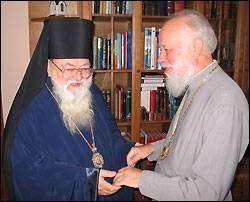 Constantinople
was represented by Archbishop Vsevolod (Majdanski) of the Ukrainian Orthodox
Church in the USA and Hieromonk Filip (Yahnysh). The Russian Orthodox Church was
represented by Protopriest Nikolai Balashov, secretary of Inter-Orthodox
Relations of the Department of External Church Relations, and Sergei Govorun,
representative of the Department of External Church Relations.
Constantinople
was represented by Archbishop Vsevolod (Majdanski) of the Ukrainian Orthodox
Church in the USA and Hieromonk Filip (Yahnysh). The Russian Orthodox Church was
represented by Protopriest Nikolai Balashov, secretary of Inter-Orthodox
Relations of the Department of External Church Relations, and Sergei Govorun,
representative of the Department of External Church Relations.
The
participants of the meeting were received by Metropolitan Volodymyr at the Kyiv
Monastery of the Caves. They discussed current religious issues in Ukraine. The
consultative meetings in Kyiv were organized with the support of the head of
Ukraine’s National Committee on Religious Matters, Viktor Bondarenko, who
expressed the opinion of the Ukrainian government on this matter.
The
participants highly praised the joint efforts of both patriarchates to solve
current religious problems in Ukrainian society.
Source:
www.orthodox.org.ua
National Sobor Celebrates Growth
On 15 July 2004,
the National Sobor (Assembly) of the Ukrainian Orthodox Church-Kyivan
Patriarchate (UOC-KP) began its work with a Liturgy in St. Michael’s Gold-domed
Cathedral in Kyiv. The main objectives of the sobor are to analyze the work done
by the UOC-KP after the National Sobor in 1995, to examine the situation in
which the UOC-KP lives and functions, and to outline ways of further
development. In his report given on the first day of the sobor, the head of the
UOC-KP, Patriarch Filaret (Denysenko), claimed that the church has doubled since
the sobor of 1995.
Patriarch Filaret in his report called the National
Sobor the higher church administration of the UOC-KP. He claimed that since the
National Sobor of 1995, the UOC-KP has doubled. In 1995, the UOC-KP had 19
eparchies in Ukraine; in 2004, 29 eparchies in Ukraine, 3 eparchies abroad and 1
vicariate in the USA. In 1995 there were 16 hierarchs; today there are 37
metropolitans, archbishops and bishops.
The number of establishments of
theological education has increased from 4 to 10, where over 1500 students are
studying. In this period, 3445 priests graduated from seminaries, and 358
specialists graduated from theological academies and faculties, of whom 75 have
candidate’s degrees in theological studies. Over two thousand students joint the
ranks of the clergy. Today in the parishes of the UOC-KP there are 2892 priests
and deacons. Since 1995, the number of monasteries has increased from 18 to 64,
one of them being St. Michael’s Golden-domed Monastery. During this period the
number of parishes has tripled: from 1188 to 3760.
Patriarch Filaret says
that the main objective of the UOC-KP is to establish a single national
Ukrainian Orthodox church in Ukraine. “Today we have a national Orthodox church,
which is the Kyivan Patriarchate. But we need to unite all Ukrainian Orthodoxy
around Kyiv. Another issue of great importance is the recognition of the
autocephality of the Ukrainian Orthodox Church by the Ecumenical Patriarchate
and other national Orthodox churches. The recognition of our autocephality
largely depends on the union of Ukrainian Orthodoxy,” emphasized Filaret in his
report.
According to the patriarch, the task of the sobor is to adopt
renewed statutes of the administration of the UOC-KP, because up to this time
the UOC-KP has been regulated by the statutes of the Ukrainian Autocephalous
Orthodox Church, with the amendments and supplements adopted at the All-Ukraine
Union Sobor in June 1992.
Source: www.kievpatr.org.ua
Orthodox Sobor Addresses Presidential
Elections
After the
National Sobor (Assembly) of the Ukrainian Orthodox Church-Kyivan Patriarchate
(UOC-KP) finished its work in Kyiv on 16 July 2004, it approved an address
concerning the presidential elections to be held in Ukraine on 31 October. In
the document, the hierarchs call on Ukrainians to pray for fair elections and
they give advice on what criteria to take as the basis for the choice of the new
head of the country.
In the text of the address, the sobor states that
every citizen “has the right and duty to freely vote during the presidential
elections in Ukraine for the candidate who, in their opinion, is the most worthy
of heading the Ukrainian government.”
In addition, the address mentions
possible falsification during the elections: “Any violation of the right to make
a free choice, and the manipulation of the results of the people’s free will is
one of them, is not only an action punished by state laws, but is also contempt
for the law of God. Therefore, everybody who tries to commit this evil action
will be punished by God.”
The National Sobor of the UOC-KP called upon
the faithful and all citizens of Ukraine to make the following criteria the
basis for their choice of president: high ethical and moral qualities, love for
their people and their country, desire to take care of the strengthening of
sovereignty, the political and economic independence of Ukraine, and the revival
of the spirituality of the Ukrainian people on the basis of traditional
Christian and general human values.
The National Sobor of the UOC-KP
passed a decision calling all its Ukrainian faithful to pray for fair
presidential elections in Ukraine.
Source:
www.uaorthodox.org
Monument to Persecuted Orthodox Priests Opened in
Cherkasy
A monument to
commemorate 142 priests who were persecuted during the years of Stalin’s regime
has been erected in central Ukrainian Cherkasy. The monument consists of a
cracked brass bell and a priest leaning over it. This news was reported by the
information agency “News-Ukraine” on 19 June 2004.
In the 1930s, a
trainload of Orthodox bishops, priests and deacons was destroyed in the Cherkasy
region and only Fr. Mykhailo Lypianskyi managed to escape. By 1938, officers of
the People's Commissariat of Internal Affairs, the Soviet security service, had
killed the clergy and destroyed most churches in the region.
During a
meeting near the monument on 18 June 2004, it was stressed that the 142 priests
who were killed by the communists should be proclaimed martyrs and righteous by
the church.
Source: http://newsukraina.ru
New
Orthodox Bishop of Sumy and Okhtyrka Ordained
Patriarch
Filaret, head of the Ukrainian Orthodox Church-Kyivan Patriarchate (UOC-KP),
ordained Fr. Mykola Sribniak as bishop of Sumy and Okhtyrka in St. Volodymyr’s
Cathedral in Ukraine’s capital, Kyiv, on 6 June 2004. 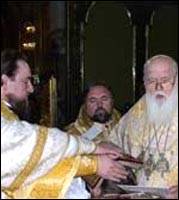
A day
before, Patriarch Filaret, together with Archbishop Dymytrii of
Pereiaslav-Khmelnytskyi, and bishops Oleksandr of Bila Tserkva and Falvian of
Kharkiv and Bohodukhiv, participated in an enthronement ceremony and named Fr.
Mykola as Bishop Mefodii of Sumy and Okhtyrka. He was appointed bishop by the
Synod of the UOC-KP on 14 May 2004.
“The bishop’s ministry is great work
and sacrificial dying for the sake of love for the flock and the church,” said
Patriarch Filaret during the ordination ceremony. “The connection between the
bishop and flock is not fulfilled through domination but through mutual love. On
behalf of the bishop, love should be epitomized in parental care, while the
laity should demonstrate filial gratitude.”
Bishop Mefodii of Sumy and
Okhtyrka was born on 8 June 1957 in the village of Hrabivka, Kalush district,
Ivanko-Frankivsk region. In 1995, he was ordained as deacon and later as priest.
From 1996 to 2004, he worked as secretary of the Dnipropetrovsk and
Kryvorizhzhia eparchy. In 1999 and 2004, Fr. Sribniak graduated from the Volyn
Theological Seminary and the Lviv Spiritual Academy, respectively.
Source:
www.uaorthodox.org
Patriarch Filaret Amoung Ukrainian Church Leaders Signing
Address on Respect for Human Life
On 1 June 2004, a
conference was held at the UNIAN news agency in Kyiv with the participation of
representatives of churches whose heads had signed “The Address of Christian
Churches of Ukraine to the State and the Ukrainian Nation on the Protection of
Life.” The main initiative of the Christian churches of Ukraine on this issue
was the establishment of an international committee on the protection of life,
reports the press-service of the head of Ukrainian Greek Catholic Church.
In particular, the address says that on average in Ukraine half of
pregnancies are terminated through abortion, that is, the murder of unborn
children in their mothers’ wombs. As a result, during the 12 years of its
independence, Ukraine actually lost 8.5 million unborn citizens. This figure is
also associated with the sad fact that one in five married couples is childless,
because in 60% of cases, bareness is caused by post-abortion
complications.
According to the address of the representatives of the
churches, “the protection of the right to life of the unborn child, the revival
of family values, and, as as result, the solution of the demographic crisis, is
a common cause to which all members of society should contribute within their
power.”
“The church recognizes that the life of every human person begins
from the moment of conception, and, therefore, the artificial termination of
pregnancy, abortion, is nothing less than the murder of a helpless little human
being,” stresses the address.
The church representatives are particularly
indignant at the fact that there not only exists commonly accepted infanticide
in Ukraine, but also legal use of “human embryos,” bodies of children killed
through abortions, in medical practice.
The representatives of the
Christian churches associate the issue of the murder of unborn children with the
crises of the family. “We are firmly convinced that in the issue of the
degradation of the family as a social institution, Ukrainian society will
definitely go into decline, lose its originality and identity,” stresses the
address.
The address emphasizes that the Christian churches of Ukraine,
representing an integral part of society, despite the differences existing
between them, are showing willingness to work jointly in the areas of the
protection of life and the revival of the family.
“We support the idea of
the establishment of an all-Ukrainian interconfessional committee for the
protection of human life, which can involve not only Christians, but also
representatives of Islam and Judaism, who have the same views on social issues
as we do. The organization and work of such a committee may become a model of
the unification of people with different views for the sake of the achievement
of a common goal,” says the address.
The representatives of the Christian
churches called the Parliament and government of Ukraine to review existing
legislation regulating questions of the artificial termination of pregnancy and
to strengthen the social protection and care of families with regard to giving
birth and rearing children, actively promote the increase of the number of
children in families, and support families having many children.
As for
doctors, they are called not only to abstain from taking part in the performance
of abortions, but also to help promote the idea that abortion is both
infanticide and an action harmful for the female organism which can lead to
irreparable consequences.
“The churches which we represent protest
strongly the commercial use of children killed through abortions (so-called
“abortive material”) and, therefore, we appeal to doctors and scientists not to
participate in actions associated with it and we are asking the Parliament of
Ukraine to make appropriate amendments. In general, we see as unacceptable any
actions resulting in the destruction of a conceived fetus or commercial use
thereof, including means of artificial insemination.”
The address calls
teachers and doctors to help prepare young people for married life and the
responsibilities of parenthood, as well as to spread knowledge of the fact that
killing an unborn child cannot be a solution to problems.
Politicians,
men of science and culture, and journalists are called to use their influence on
society to protect the lives of unborn children and to ensure that new means of
social communication do not become “new means of the spread of evil in the
world.”
The representatives of the Christian churches are convinced that
only together, by the joint efforts of all social institutions, can it be
possible to overcome the difficulties of the formation of the Ukrainian society,
build it on a firm spiritual basis, make it capable of protecting the life of
every human and of giving him or her the opportunity for harmonious
development.
The address was signed by Patriarch Filaret, head of the
Ukrainian Orthodox Church-Kyivan Patriarchate; Cardinal Lubomyr Husar, head of
the Ukrainian Greek Catholic Church; Bishop Markian Trofimjak, vicar general of
the Conference of Roman Catholic Bishops in Ukraine; Hryhorii Komendant head of
the All-Ukraine Union of the Association of Evangelical Baptists; Leonid Padun,
senior bishop of the Ukrainian Christian Evangelical Church; Mykhailo Panochko,
bishop of the Church of Evangelical Christians of Ukraine; Vasyl Raichynets,
senior bishop of the Union of Free Churches of Evangelical Christians of
Ukraine; and Volodymyr Krupskyi, president of the Ukrainian Union Conference of
the Church of Seventh-day Adventists.
Source:
www.ugcc.org.ua
Bulgarian Premier Visits Orthodox St. Michael’s Church, Caves
Monastery in Kyiv
During his
official visit to Ukraine on 22 May 2004, Simeon Saxe-Coburg Gotha, head of the
Council of Ministers of the Republic of Bulgaria, visited St. Michael’s Church
and the Kyivan Monastery of the Caves in Ukraine’s capital, Kyiv.
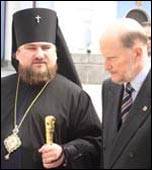 Archbishop Dymytrii of Pereiaslav-Khmelnytskyi of the Ukrainian
Orthodox Church-Kyivan Patriarchate told Prime Minister Saxe-Coburg Gotha about
the history and interior of St. Michael’s Church and showed the Bulgarian
delegation around the church building. The Bulgarian premier presented St.
Michael’s Church with an icon of St. George.
Archbishop Dymytrii of Pereiaslav-Khmelnytskyi of the Ukrainian
Orthodox Church-Kyivan Patriarchate told Prime Minister Saxe-Coburg Gotha about
the history and interior of St. Michael’s Church and showed the Bulgarian
delegation around the church building. The Bulgarian premier presented St.
Michael’s Church with an icon of St. George.
On the same day, Archbishop
Mytrofan of Vyshhorod of the Ukrainian Orthodox Church-Moscow Patriarchate
(UOC-MP) welcomed Prime Minister Saxe-Coburg Gotha to the Kyivan Monastery of
the Caves. He presented an icon of the Mother of God of the Monastery of the
Caves and showed the premier around the monastery.
Sources:
www.uaorthodox.org, www.orthodox.org.ua
Orthodox (UOC-KP) Patriarch Visits Odesa Despite Moscow
Patriarchate Opposition
On 6 May 2004,
despite severe protests of the faithful of the Odesa metropolitanate of the
Ukrainian Orthodox Church-Moscow Patriarchate (UOC-MP) and representatives of
the pro-Russian organizations Single Fatherland and the Union of Orthodox
Citizens, Patriarch Filaret, head of the Ukrainian Orthodox Church-Kyivan
Patriarchate arrived for a two-day pastoral visit to southern Ukrainian Odesa.
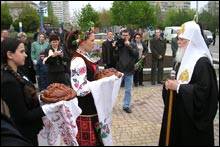 Patriarch Filaret assured his faithful that he will continue to
perform his duties and no opposition of the Russian Church will force him to
cancel his pastoral visit.
Patriarch Filaret assured his faithful that he will continue to
perform his duties and no opposition of the Russian Church will force him to
cancel his pastoral visit.
“I have not come to visit the church of the
Moscow Patriarchate,” said Patriarch Filaret. “Neither do we conduct
demonstrations near Moscow Patriarchate churches. It is the Russian Church which
provokes conflict,” he stressed.
On 6 May 2004, representatives of the
UOC-MP attempted to block the way to the UOC-KP Cathedral of the Nativity so
that Patriarch Filaret could not enter the church and celebrate a Liturgy.
However, they failed.
Patriarch Filaret, together with Bishop Paisii of
Odesa and Balta, celebrated a Divine Liturgy, after which he was greeted by
Pastor Petro Martianov, secretary of the Spiritual Council of Christian
Denominations, and Oleksandr Sorokin, president of the Black Sea Christian
Center Mission for Sailors.
Later that day, Patriarch Filaret gave a
press conference in the Nativity Church in Odesa.
“The Moscow
Patriarchate in Odesa uses the church to pursue some political objectives,” said
Patriarch Filaret, commenting on the protests of the Odesa metropolitanate of
the UOC-MP and some pro-Russian organizations. He called their offensive
statements “a demonstration of inciting religious feud on political grounds.”
“The Moscow Patriarchate has nothing to do with the Kyivan
Patriarchate,” emphasized Patriarch Filaret. According to him, the latest
sociological surveys say the majority of Orthodox Christians in Ukraine are in
favor of the Kyivan Patriarchate.
In the afternoon, Patriarch Filaret
visited the city of Yuzhne, where he consecrated the cornerstone of the future
UOC-KP church. In addition, he visited the Ukrainian Viacheslav Chornovil
gymnasium, where he met with instructors and students.
On that day,
Patriarch Filaret celebrated a Divine Liturgy in the newly consecrated Church of
St. Vitalii in Odesa.
source:RISU.org.ua
Pro-Russian Picketers Disrupt Orthodox (UOC-KP) Church
Consecration in Odesa
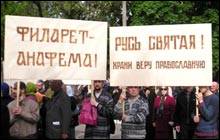 UNIAN news agency,
Kyiv, Ukraine, in Ukrainian-BBC Monitoring Service, UK, in English, Wednesday,
May 05, 2004- ODESA - About 500 pro-Russian activists of the One Homeland civic
organization and monks from various monasteries of the Ukrainian Orthodox
Church-Moscow Patriarchate today picketed St Vitalii's Church in Odesa for five
hours, preventing believers of the Ukrainian Orthodox Church of the Kyiv
Patriarchate from attending a service in the church, which was to be consecrated
by the bishop of Odesa and Balta of the Ukrainian Orthodox Church of the Kyiv
Patriarchate, Paisii.
UNIAN news agency,
Kyiv, Ukraine, in Ukrainian-BBC Monitoring Service, UK, in English, Wednesday,
May 05, 2004- ODESA - About 500 pro-Russian activists of the One Homeland civic
organization and monks from various monasteries of the Ukrainian Orthodox
Church-Moscow Patriarchate today picketed St Vitalii's Church in Odesa for five
hours, preventing believers of the Ukrainian Orthodox Church of the Kyiv
Patriarchate from attending a service in the church, which was to be consecrated
by the bishop of Odesa and Balta of the Ukrainian Orthodox Church of the Kyiv
Patriarchate, Paisii.
Picketers shouted curses against [Kyiv
Patriarchate head] Patriarch Filaret and the leaders of [opposition
parliamentary factions] Our Ukraine and the Yuliya Tymoshenko Bloc, Viktor
Yushchenko and Yuliya Tymoshenko.
"This event, of which the local
authorities had been aware but failed to prevent, resulted in a flagrant
violation of the constitutional rights of local believers of the Ukrainian
Orthodox Church of the Kyiv Patriarchate," the secretary of the Odesa eparchial
department of the Ukrainian Orthodox Church of the Kyiv Patriarchate, Hegumen
Havryyil, has told UNIAN in an interview. "People had to walk into their own
temple this morning literally through a corridor of Ukrainian-haters, who
shouted: ‘An anathema on Filaret,’ held other insulting slogans and grabbed some
of the older female parishioners by the arm, leaving some of them in tears."
It was only thanks to support from a big group of parishioners, who are
members of the local Ukrainian Brotherhood headed by Roman Devyatov, that
priests and Bishop Paisii managed to enter St Vitalii's Church.
"Hundreds of well-organized law offenders, including Russian citizens,
with the connivance of the local authorities, tried to strip Odesa residents of
the right to the free choice of a religious denomination," the eparchial
secretary stressed. "Despite these illegal acts, which were aimed against
believers and the patriarch of Kyiv and all Ukraine-Rus, head of the Ukrainian
Orthodox Church of the Kyiv Patriarchate, Filaret, the ceremony to consecrate
the church did take place. The scheduled visit to Odesa region by Patriarch
Filaret, whom thousands of Orthodox believers are looking forward to meeting on
their land, will also be held regardless."
Hegumen Havryyil believes
that the incident today was intended "to incite sectarian hatred and to stage
mass street clashes" and once again demonstrates the methods that are being used
in relations with believers of the Ukrainian Orthodox Church of the Kyiv
Patriarchate by "the pro-Moscow figures and pastors of the church. Odesa
residents have had the chance to see for themselves that the authorities and
law-enforcement bodies are turning a blind eye to illegal actions by organized
groups of people, who stop thousands of citizens from fulfilling their
constitutional right to freedom of religion and the choice of a denomination."
[The Moscow and Kyiv patriarchates have been locked in bitter disputes
over church property and other issues since Filaret declared independence from
the Russian Orthodox Church and consequently was anathemized by Moscow.]
Source: THE
ACTION UKRAINE REPORT Year 04, Number 73
UOC-MP Threats Will Not Intimidate Patriarch Filaret,
Say UOC-KP Orthodox
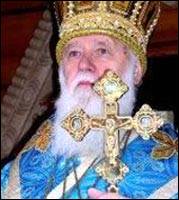 On 3 May 2004, the press service of the Ukrainian Orthodox
Church-Kyivan Patriarchate (UOC-KP) released a statement asking administrative
bodies and the mass media to condemn the severe opposition and threats of the
Ukrainian Orthodox Church-Moscow Patriarchate (UOC-MP) against the visit of
Patriarch Filaret, head of the UOC-KP, to southern Ukrainian Odesa, planned from
4 to 6 May 2004.
On 3 May 2004, the press service of the Ukrainian Orthodox
Church-Kyivan Patriarchate (UOC-KP) released a statement asking administrative
bodies and the mass media to condemn the severe opposition and threats of the
Ukrainian Orthodox Church-Moscow Patriarchate (UOC-MP) against the visit of
Patriarch Filaret, head of the UOC-KP, to southern Ukrainian Odesa, planned from
4 to 6 May 2004.
Earlier, Bishop Paisii of Odesa and Balta of the
UOC-KP, who invited the UOC-KP’s leader to visit his eparchy, commented on some
protesters’ statements. He said that, despite protests by the Odesa
metropolitanate of the Ukrainian Orthodox Church-Moscow Patriarchate (UOC-MP),
Single Fatherland, and other pro-Russian organizations, the visit will take
place.
The threats of physical revenge for Patriarch Filaret’s visit to
Odesa by members of the Moscow Patriarchate in Odesa will by no means intimidate
the UOC-KP patriarch, clergy and faithful into refusing to fulfill their
religious and pastoral duties, stressed the UOC-KP’s latest statement.
In addition, the UOC-KP announced that they had asked the competent
administrative bodies to evaluate the acts of the UOC-MP representatives. They
also requested that the mass media provide objective information on the events
surrounding Patriarch Filaret’s visit to Odesa.
The full text of the
UOC-KP’s statement of 3 May 2004 in Ukrainian can be found on RISU’s Ukrainian
language site. http://www.risu.org.ua/index.php?l=en
Source:
press service of the UOC-KP
|
Patriarch Filaret To Visit Odesa |
|
Despite protests
by the Odesa metropolitanate of the Ukrainian Orthodox Church-Moscow
Patriarchate (UOC-MP), Single Fatherland, and other pro-Russian
organizations, the visit of Patriarch Filaret, head of the Ukrainian
Orthodox Church-Kyivan Patriarchate (UOC-KP), to southern Ukrainian Odesa,
will take place in early May 2004 as planned. This announcement was made
by Bishop Paisii of Odesa and Balta of the UOC-KP, who responded to some
of the protesters’ statements on 30 April 2004 .
On 29 April, Valerii
Kaurov, head of the press service of Single Fatherland, released a protest
statement to Ruslan Bodelan, mayor of Odesa. “The Odesa women are already
preparing ‘a decent welcome greeting’ for Filaret, “ reads the statement.
“Filaret will only bring feud and repudiation of the faith to Odesa. His
arrival will aggravate the social and interreligious situation in the city
and cause riots. The citizens of Odesa will not become a toy in the hands
of religious politicians who are trying to win cheap popularity for their
future political battles.”
Metropolitan Ahafanhel of Odesa and
Izmail of the UOC-MP sent a letter to Serhii Hrynevetskyi, head of the
Odesa regional administration, in which he called this visit “explosive”
and recommended that Patriarch Filaret abstain from visiting Odesa.
In response, Bishop Paisii called the threats against Patriarch
Filaret and the faithful of the UOC-KP cynical. “In fact, they find fault
in the very fact that we exist,” said the bishop. “The Odesa
Metropolitanate of the Moscow Patriarchate threatens to destroy us. They
are outraged at the existence of the Ukrainian Church and the visit of its
head. It is surprising that there has been no reaction to these violent
illegal actions,” said Bishop Paisii.
“Concerning the moral and
Christian aspects of the released statement by Single Fatherland and the
Moscow Patriarchate,” continued Bishop Paisii, “there nothing to comment
upon. It is clear to everyone that the Odesa Metropolitanate of the Moscow
Patriarchate has become an organization of an overtly political character.
At least, this refers to the spiritual leaders of the UOC-MP in Odesa.
Regarding the faithful, I think, they have different opinions,” stressed
Bishop Paisii.
“The Moscow Patriarchate in Odesa uses the church
for political purposes,” stated Patriarch Filaret of the UOC-KP. “Such
statements are a testimony to the incitement of religious feud on
political grounds. The Moscow Patriarchate has no relation to the Kyivan
Patriarchate whatsoever. Ukraine will soon have one national church, and
the Moscow Church twill not be in Ukraine ,” stressed Patriarch Filaret.
Source:
risu.org |
Ukraine Needs United
Church, Says Orthodox (UOC-KP) Patriarch in Crimea
“An independent
state, which Ukraine is, must have its own united church and tendencies towards
this are becoming more powerful in this country,” stated Patriarch Filaret, head
of the Ukrainian Orthodox Church-Kyivan Patriarchate (UOC-KP), during his visit
to southern Ukrainian Crimea, on 26 April 2004. 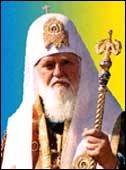
Patriarch Filaret
expressed his content over the increase of UOC-KP parishes in Crimea. Since his
last visit in 2000, their number has reached 23, with ten priests involved in
ministerial work.
In addition,
Patriarch Filaret said that during his visit he met with Khadzhi Emirali Ablaev,
mufti of the Crimean Muslim community, and Mustafa Dzhamilev, head of the Mejlis
of Crimean Tatars. He stressed that he is satisfied with the good and friendly
relationships between the UOC-KP and Muslim communities in Crimea. “We are
determined to achieve normal relations between Christians and Muslims on the
Crimean land,” said Patriarch Filaret. “And I am happy that the mufti and the
Mejlis leader are of the same opinion.” Patriarch Filaret went on to point out
that there was a third force, interested in fomenting interethnic feud in Crimea
and people should not let themselves be provoked into conflicts. “This is the
force which doesn’t want Ukraine to be an independent state,” emphasized
Patriarch Filaret.
During a press
conference held in the Church of Sts. Volodymyr and Olha in Simferopol, about 40
representatives of the Ukrainian Orthodox Church-Moscow Patriarchate, including
clergy, picketed the church, protesting Patriarch Filaret’s visit. In addition,
they attempted to block the way while Patriarch Filaret was leaving the church
in a car. “We are not against the Moscow Patriarchate, even though they do not
demonstrate a brotherly attitude towards Ukraine,” stated Patriarch Filaret,
commenting on that incident.
During his visit
to Crimea, Patriarch Filaret consecrated a health resort for orphaned children
in the village of Nykyta near Yalta. It opened as part of a joint project of the
UOC-KP and the Roman Catholic Church and will be available for Ukrainian
orphaned children regardless of their religion.
Source:
http://ua.proua.com
Court Rules
Poltava Church Should Belong to UOC-KP
Ending a two-year
conflict between the Ukrainian Orthodox Church-Kyivan Patriarchate (UOC-KP) and
the Ukrainian Orthodox Church-Moscow Patriarchate (UOC-MP), the Zhovtnevyi court
in central Ukrainian Poltava accepted the plea of the UOC-KP and decided the
local Church of St. Michael should belong to the UOC-KP. This news was reported
on 30 April 2004.
The court decided that Serhii Znamenskyi of the UOC-MP, former
head of the church, illegally possessed the official seal, the church’s money,
and accounting documents of the UOC-KP religious community.
During a
press conference after the hearings in Poltava, representatives of the UOC-KP
stated that because of the conflict they had to conduct services outside near
the closed door of the church. They thanked the faithful for their remarkable
spiritual feat of praying outside in all weather.
According to the
UOC-KP, in 2002 Znamenskyi decided to transfer the Church of St. Michael to the
UOC-MP and since then has been working to fulfill this plan. He did this,
however, without convening a parishioners’ assembly. Only 10 parishioners out of
100 signed a protocol on the church’s transfer to the UOC-MP jurisdiction. The
UOC-KP representatives said Znamenskyi used the church and adjacent building to
start his private enterprise Dyskos, which sold weapons and alcohol.
In
2002, St. Michael’s Church was closed by the authorities until the conflict was
resolved. In May 2003, a clash occurred between members of the UOC-KP and UOC-MP
communities, after which the UOC-KP accused the UOC-MP of taking the church by
force.
Source: www.podrobnosti.ua
Orthodox Patriarch Receives
Award
Patriarch
Filaret, head of the Ukrainian Orthodox Church-Kyivan Patriarchate (UOC-KP), on
30 March 2004 served a memorial service in the town of Brusyliv, central
Ukrainian Zhytomyr region, to commemorate Metropolitan Illarion (Ivan Ohienko),
a prominent Ukrainian religious activist and scholar. During the ceremony, the
Ohienko Committee awarded Metropolitan Filaret with the Ivan Ohienko prize.
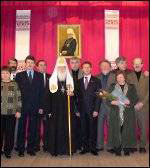
“This award was quite unexpected for me,” said Patrarch
Filaret. “I didn't expect that a spiritual person can be given any prize.” He
also added that he accepted this prize not as a recognition of his personal
contribution, but as a recognition of the work of the UOC-KP for the good of
society.
Source: file:///C|/Program%20Files/www.uaorthodox.org
President of the Ukraine
Honors Orthodox (UOC-KP) Patriarch Filaret on 75th Birthday
On 23 January 2003,
Ukrainian President Leonid Kuchma greeted Patriarch Filaret, head of the
Ukrainian Orthodox Church-Kyivan Patriarchate (UOC-KP), on his 75th birthday and
awarded him the order of Prince Yaroslav the Wise.
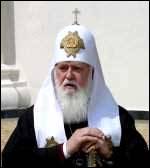 “I am grateful
for such a high evaluation of my work,” said Patriarch Filaret. “I think this is
my calling. For more than 50 years I have served the church and I believe this
is my duty to support our people's spirituality and moral values. No country and
no nation can exist without them,” stressed Patriarch Filaret.
“I am grateful
for such a high evaluation of my work,” said Patriarch Filaret. “I think this is
my calling. For more than 50 years I have served the church and I believe this
is my duty to support our people's spirituality and moral values. No country and
no nation can exist without them,” stressed Patriarch Filaret.
His Holiness
Patriarch Filaret – 75! Greetings and Best Wishes received from all over the
World
On a cold day in
Kyiv on January 23, 2004 the National Philharmonic Hall was filled to capacity
with the warmth and good wishes from thousands of dignitaries gathered to honor
and celebrate the 75 th birthday of His Holiness Filaret, Patriarch of Kyiv and
All Ukraine.
President Leonid
Kuchma honored Patriarch Filaret with Ukraine's highest honor, Order of Jaroslav
the Wise, as well as a gift of an icon from the 18 th century of Apostle Ioan.
Hundreds of
greeting and best wishes were received from heads of state, ambassadors and
dignitaries from all over the world.
Warmest greetings
and well wishes were also received from the children of blessed memory Patriarch
Mstyslav as well as the children of blessed memory Patriarch Volodymyr.
Present at the
celebration in Kyiv was a special guest from New York City. Mr. Vsevolod
Salenko, President of the Board of Trustees of St. Volodymyr Cathedral, New York
City, who is also President of Ukrainian National Federal Credit Union, was at
the celebration. In a deeply moving speech to the assembled Mr. Salenko extended
best wishes and warmest greeting from the parish of St. Volodymyr's as well as
the Board of Directors of the Ukrainian National Federal Credit Union.
Conspicuously
absent were any greetings or acknowledgements from the hierarchs of UOC-USA and
their “canonical brethren” the hierarchs of Moscow Patriarchate in Ukraine.
(source Save Our Ukrainian Orthodox Church http://saveouruoc.com//)
Return to Home
Page
 been relieved
of all administrative duties and removed from effective control of the
Patriarchate.
been relieved
of all administrative duties and removed from effective control of the
Patriarchate.  According to
Asmarino.com , the 'freezing' of individuals who fall out of favour with the
government is prevalent in Eritrea and is primarily undertaken as an act of
humiliation. Article 32 of the constitution of the Orthodox Church states that
its administrative body, the Holy Synod, is meant to function under the
chairmanship of the Patriarch who is the chief administrator of the church.
According to
Asmarino.com , the 'freezing' of individuals who fall out of favour with the
government is prevalent in Eritrea and is primarily undertaken as an act of
humiliation. Article 32 of the constitution of the Orthodox Church states that
its administrative body, the Holy Synod, is meant to function under the
chairmanship of the Patriarch who is the chief administrator of the church.
 A panakhyda
(memorial service) for the late Pope John Paul II was held at St. Volodomyr's
Cathedral of the Ukrainian Orthodox Church-Kyivan Patriarchate (UOC-KP) on 8
April 2005. According to Ukraine's TV Channel 5, this was the first time in the
history of the Orthodox Church that a Pope was prayed for in an Orthodox
Cathedral.
A panakhyda
(memorial service) for the late Pope John Paul II was held at St. Volodomyr's
Cathedral of the Ukrainian Orthodox Church-Kyivan Patriarchate (UOC-KP) on 8
April 2005. According to Ukraine's TV Channel 5, this was the first time in the
history of the Orthodox Church that a Pope was prayed for in an Orthodox
Cathedral.  Never has the death of
a Pope elicited so much praise from other faiths, uniting Christians, Jews,
Muslims and even atheists in mourning.
Never has the death of
a Pope elicited so much praise from other faiths, uniting Christians, Jews,
Muslims and even atheists in mourning.  Even Islamic
fundamentalist groups such as Hamas and Islamic Jihad joined in the chorus: “We
remember the statements of His Holiness the Pope on the rights of the
Palestinians, and we hope that the Vatican leadership will stick to his position
against the occupation,” Sami Abu Zohari, a Hamas spokesman, said.
Even Islamic
fundamentalist groups such as Hamas and Islamic Jihad joined in the chorus: “We
remember the statements of His Holiness the Pope on the rights of the
Palestinians, and we hope that the Vatican leadership will stick to his position
against the occupation,” Sami Abu Zohari, a Hamas spokesman, said.
 The 24 March
statement of Archbishop Vsevolod (Majdanski), a representative of the
Patriarchate of Constantinople, in which the archbishop said the patriarchate
only recognizes the canonical territory of the Moscow Patriarchate in its
pre-1686 boundaries, before the addition of the Kyiv Metropolitanate, is serious
and fair. This is according to Bishop Mykhail (Zinkevych) of Lutsk and Volyn of
the Ukrainian Orthodox Church–Kyivan Patriarchate (UOC-KP), who discussed the
subject at a press conference of 1 April 2005.
The 24 March
statement of Archbishop Vsevolod (Majdanski), a representative of the
Patriarchate of Constantinople, in which the archbishop said the patriarchate
only recognizes the canonical territory of the Moscow Patriarchate in its
pre-1686 boundaries, before the addition of the Kyiv Metropolitanate, is serious
and fair. This is according to Bishop Mykhail (Zinkevych) of Lutsk and Volyn of
the Ukrainian Orthodox Church–Kyivan Patriarchate (UOC-KP), who discussed the
subject at a press conference of 1 April 2005.  Patriarch Filaret
(Denysenko), head of the Ukrainian Orthodox Church-Kyivan Patriarchate (UOC-KP),
served a panakhyda (memorial service) for the souls of the victims of the
Ukrainian Holodomor (Stalin-engineered famine) of 1932 –3. The service took
place on 26 March 2005 in the Patriarchal Cathedral of St. Volodymyr, with the
participation of Ukrainian President Viktor Yushchenko, Prime Minister Yulia
Tymoshenko, and other government representatives.
Patriarch Filaret
(Denysenko), head of the Ukrainian Orthodox Church-Kyivan Patriarchate (UOC-KP),
served a panakhyda (memorial service) for the souls of the victims of the
Ukrainian Holodomor (Stalin-engineered famine) of 1932 –3. The service took
place on 26 March 2005 in the Patriarchal Cathedral of St. Volodymyr, with the
participation of Ukrainian President Viktor Yushchenko, Prime Minister Yulia
Tymoshenko, and other government representatives.  “The Moscow
Patriarchate consists of that territory which it encompassed to the year 1686.”
Archbishop Vsevolod (Majdanski) of the Ukrainian Orthodox Church of the USA (UOC
USA), a representative of the Ecumenical Patriarchate of Constantinople, told
this to Ukrainian President Viktor Yushchenko at a meeting on 24 March 2005. The
archbishop added that Kyiv's “subjugation” to the Russian Orthodox Church,
starting that year and continuing to the present, was not ratified by
Constantinople.
“The Moscow
Patriarchate consists of that territory which it encompassed to the year 1686.”
Archbishop Vsevolod (Majdanski) of the Ukrainian Orthodox Church of the USA (UOC
USA), a representative of the Ecumenical Patriarchate of Constantinople, told
this to Ukrainian President Viktor Yushchenko at a meeting on 24 March 2005. The
archbishop added that Kyiv's “subjugation” to the Russian Orthodox Church,
starting that year and continuing to the present, was not ratified by
Constantinople.  The bible study course of Father Oleg
Vedmedenko represents modern
theological school that continues traditions of Alexandrian-Cappadocian school:
Basil the Great, Gregory the Theologian, Gregory of Nyssa, Clement of
Alexandria, Origen and Panthen. It studies the worldview questions through the
prism of modern knowledge. To visit his web site
The bible study course of Father Oleg
Vedmedenko represents modern
theological school that continues traditions of Alexandrian-Cappadocian school:
Basil the Great, Gregory the Theologian, Gregory of Nyssa, Clement of
Alexandria, Origen and Panthen. It studies the worldview questions through the
prism of modern knowledge. To visit his web site  addressing the
delegates at a constituent assembly of the National Union of the Our Ukraine
Party on 5 March 2005.
addressing the
delegates at a constituent assembly of the National Union of the Our Ukraine
Party on 5 March 2005.  Transcarpathia
still has 118 wooden churches that were built over the past five centuries.
Forty-eight of them are registered as architectural monuments. By contrast,
Slovakia has only 27 wooden churches, but they all function normally and are
reliably protected by the state. In Transcarpathia dozens of wooden churches are
in deplorable condition. The area's cultural figures and journalists, who have
created the Cultural Brotherhood and New Form civic organizations, and
professors from the Uzhhorod College of Arts claim that the regional
authorities' campaign called “Save the Wooden Churches of Transcarpathia,” which
was launched three years ago, has boiled down to holding run-of-the-mill
concerts and failed to provide at least minimal protection for these holy
places. Activists are now drawing up a message urging President Yushchenko and
the new prime minister to adopt a government program to preserve and restore
hundreds of old wooden churches in the Ukrainian Carpathian region.
Transcarpathia
still has 118 wooden churches that were built over the past five centuries.
Forty-eight of them are registered as architectural monuments. By contrast,
Slovakia has only 27 wooden churches, but they all function normally and are
reliably protected by the state. In Transcarpathia dozens of wooden churches are
in deplorable condition. The area's cultural figures and journalists, who have
created the Cultural Brotherhood and New Form civic organizations, and
professors from the Uzhhorod College of Arts claim that the regional
authorities' campaign called “Save the Wooden Churches of Transcarpathia,” which
was launched three years ago, has boiled down to holding run-of-the-mill
concerts and failed to provide at least minimal protection for these holy
places. Activists are now drawing up a message urging President Yushchenko and
the new prime minister to adopt a government program to preserve and restore
hundreds of old wooden churches in the Ukrainian Carpathian region.  The Ukrainian Orthodox Church–Kyivan
Patriarchate (UOC–KP) is calling the Ukrainian Autocephalous Orthodox Church
(UAOC) to union and asking the Ukrainian Orthodox Church-Moscow Patriarchate
(UOC–MP) to start peaceful relations. Patriarch Filaret (Denysenko), head of the
UOC-KP, spoke about this at a press conference held in his residence on 23
February 2005.
The Ukrainian Orthodox Church–Kyivan
Patriarchate (UOC–KP) is calling the Ukrainian Autocephalous Orthodox Church
(UAOC) to union and asking the Ukrainian Orthodox Church-Moscow Patriarchate
(UOC–MP) to start peaceful relations. Patriarch Filaret (Denysenko), head of the
UOC-KP, spoke about this at a press conference held in his residence on 23
February 2005.  The Ukrainian Diaspora must be reborn or at least reformed. If there
is any doubt of the need then look no further than the recent controversy
regarding a high profile Ukrainian-American activist. He marginalized the
horror, travesty and enormity of the Holocaust by writing that “big money”
drives the “industry.”
The Ukrainian Diaspora must be reborn or at least reformed. If there
is any doubt of the need then look no further than the recent controversy
regarding a high profile Ukrainian-American activist. He marginalized the
horror, travesty and enormity of the Holocaust by writing that “big money”
drives the “industry.”  separate groups
competing for the allegiance of the Orthodox faithful in Ukraine, has called for
unification of the nation's Orthodox churches. At the same time, Patriarch
Filaret has praised laymen of another Orthodox congregation who protested their
leaders' involvement in the country's recent presidential contest.
separate groups
competing for the allegiance of the Orthodox faithful in Ukraine, has called for
unification of the nation's Orthodox churches. At the same time, Patriarch
Filaret has praised laymen of another Orthodox congregation who protested their
leaders' involvement in the country's recent presidential contest.
 Bishop Paul
Peter Jesep, Vicar General of Government Relations and Public Affairs for the
UAOC-S, said "His Holiness Patriarch Filaret of the Ukrainian Orthodox Church
Kyiv Patriarchate, leader of over 30 million worldwide, has been working
tirelessly to bring the faithful together. Within Ukraine there will be unity
and harmony some day due to the leadership of Our chief shepherd, Patriarch
Filaret who is strengthening a national spiritual identity."
Bishop Paul
Peter Jesep, Vicar General of Government Relations and Public Affairs for the
UAOC-S, said "His Holiness Patriarch Filaret of the Ukrainian Orthodox Church
Kyiv Patriarchate, leader of over 30 million worldwide, has been working
tirelessly to bring the faithful together. Within Ukraine there will be unity
and harmony some day due to the leadership of Our chief shepherd, Patriarch
Filaret who is strengthening a national spiritual identity."  Kyiv– Yulia
Tymoshenko, who was confirmed as Ukraine's new prime minister by the country's
Parliament on 4 February 2005, has presented a program for government action,
the first chapter of which is called “Faith.” According to Tymoshenko, above
all, real faith in God must be restored in society.
Kyiv– Yulia
Tymoshenko, who was confirmed as Ukraine's new prime minister by the country's
Parliament on 4 February 2005, has presented a program for government action,
the first chapter of which is called “Faith.” According to Tymoshenko, above
all, real faith in God must be restored in society.  Kyiv – The
former acting attorney general of Ukraine, Professor Oleh Lytvak, was awarded
the Order of Saint Prince Volodymyr of the Ukrainian Orthodox Church–Kyivan
Patriarchate (UOC – KP) on 2 February 2005 at the residence of Patriarch Filaret
(Denysenko), head of the UOC-KP. Vasyl Smitiukh, attorney of the Sviatoshyn
district of Kyiv, was also awarded the high order. The men were awarded for
their contribution to the development of church-state relations, support for the
creation of a single national Ukrainian Orthodox Church, and for strengthening
the principles of the morality of the law in society.
Kyiv – The
former acting attorney general of Ukraine, Professor Oleh Lytvak, was awarded
the Order of Saint Prince Volodymyr of the Ukrainian Orthodox Church–Kyivan
Patriarchate (UOC – KP) on 2 February 2005 at the residence of Patriarch Filaret
(Denysenko), head of the UOC-KP. Vasyl Smitiukh, attorney of the Sviatoshyn
district of Kyiv, was also awarded the high order. The men were awarded for
their contribution to the development of church-state relations, support for the
creation of a single national Ukrainian Orthodox Church, and for strengthening
the principles of the morality of the law in society.  Kyiv– President Viktor Yushchenko started his first day
in office with a meeting with the leaders of all the Christian churches in
Ukraine, which took place on 24 January 2005 in Kyiv's Cathedral of St. Sophia.
The clergy congratulated the newly-inaugurated president and conferred their
blessings upon him. Yushchenko said, in turn, that his team will always lend an
ear to advice from the clergy and is counting on pastoral support.
Kyiv– President Viktor Yushchenko started his first day
in office with a meeting with the leaders of all the Christian churches in
Ukraine, which took place on 24 January 2005 in Kyiv's Cathedral of St. Sophia.
The clergy congratulated the newly-inaugurated president and conferred their
blessings upon him. Yushchenko said, in turn, that his team will always lend an
ear to advice from the clergy and is counting on pastoral support.  Kyiv – The
once-destroyed Church of the Nativity of Christ on Kyiv's Postal Square, famous
as the site of the funeral services for renowned Ukrainian poet and artist Taras
Shevchenko in 1861, has been rebuilt. It was re-consecrated on 14 January 2005
by Patriarch Filaret (Denysenko), head of the Ukrainian Orthodox Church-Kyivan
Patriarchate. Viktor Yushchenko, Ukraine's president elect, Kyiv Mayor Oleksandr
Omelchenko, and National Deputy Ivan Pliushch participated in the festive
ceremony.
Kyiv – The
once-destroyed Church of the Nativity of Christ on Kyiv's Postal Square, famous
as the site of the funeral services for renowned Ukrainian poet and artist Taras
Shevchenko in 1861, has been rebuilt. It was re-consecrated on 14 January 2005
by Patriarch Filaret (Denysenko), head of the Ukrainian Orthodox Church-Kyivan
Patriarchate. Viktor Yushchenko, Ukraine's president elect, Kyiv Mayor Oleksandr
Omelchenko, and National Deputy Ivan Pliushch participated in the festive
ceremony. 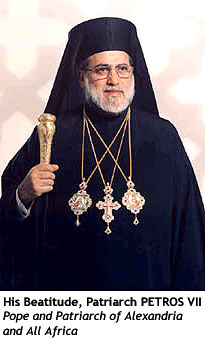
 the patriarchal
exarch of the Ukrainian Orthodox Church-Kyivan Patriarchate (UOC-KP) in Greece,
passed away on 31 July 2004. The metropolitan was appointed by the Synod on 15
March 1996.
the patriarchal
exarch of the Ukrainian Orthodox Church-Kyivan Patriarchate (UOC-KP) in Greece,
passed away on 31 July 2004. The metropolitan was appointed by the Synod on 15
March 1996.  Constantinople
was represented by Archbishop Vsevolod (Majdanski) of the Ukrainian Orthodox
Church in the USA and Hieromonk Filip (Yahnysh). The Russian Orthodox Church was
represented by Protopriest Nikolai Balashov, secretary of Inter-Orthodox
Relations of the Department of External Church Relations, and Sergei Govorun,
representative of the Department of External Church Relations.
Constantinople
was represented by Archbishop Vsevolod (Majdanski) of the Ukrainian Orthodox
Church in the USA and Hieromonk Filip (Yahnysh). The Russian Orthodox Church was
represented by Protopriest Nikolai Balashov, secretary of Inter-Orthodox
Relations of the Department of External Church Relations, and Sergei Govorun,
representative of the Department of External Church Relations. 
 Archbishop Dymytrii of Pereiaslav-Khmelnytskyi of the Ukrainian
Orthodox Church-Kyivan Patriarchate told Prime Minister Saxe-Coburg Gotha about
the history and interior of St. Michael’s Church and showed the Bulgarian
delegation around the church building. The Bulgarian premier presented St.
Michael’s Church with an icon of St. George.
Archbishop Dymytrii of Pereiaslav-Khmelnytskyi of the Ukrainian
Orthodox Church-Kyivan Patriarchate told Prime Minister Saxe-Coburg Gotha about
the history and interior of St. Michael’s Church and showed the Bulgarian
delegation around the church building. The Bulgarian premier presented St.
Michael’s Church with an icon of St. George.  Patriarch Filaret assured his faithful that he will continue to
perform his duties and no opposition of the Russian Church will force him to
cancel his pastoral visit.
Patriarch Filaret assured his faithful that he will continue to
perform his duties and no opposition of the Russian Church will force him to
cancel his pastoral visit.  UNIAN news agency,
Kyiv, Ukraine, in Ukrainian-BBC Monitoring Service, UK, in English, Wednesday,
May 05, 2004- ODESA - About 500 pro-Russian activists of the One Homeland civic
organization and monks from various monasteries of the Ukrainian Orthodox
Church-Moscow Patriarchate today picketed St Vitalii's Church in Odesa for five
hours, preventing believers of the Ukrainian Orthodox Church of the Kyiv
Patriarchate from attending a service in the church, which was to be consecrated
by the bishop of Odesa and Balta of the Ukrainian Orthodox Church of the Kyiv
Patriarchate, Paisii.
UNIAN news agency,
Kyiv, Ukraine, in Ukrainian-BBC Monitoring Service, UK, in English, Wednesday,
May 05, 2004- ODESA - About 500 pro-Russian activists of the One Homeland civic
organization and monks from various monasteries of the Ukrainian Orthodox
Church-Moscow Patriarchate today picketed St Vitalii's Church in Odesa for five
hours, preventing believers of the Ukrainian Orthodox Church of the Kyiv
Patriarchate from attending a service in the church, which was to be consecrated
by the bishop of Odesa and Balta of the Ukrainian Orthodox Church of the Kyiv
Patriarchate, Paisii.  On 3 May 2004, the press service of the Ukrainian Orthodox
Church-Kyivan Patriarchate (UOC-KP) released a statement asking administrative
bodies and the mass media to condemn the severe opposition and threats of the
Ukrainian Orthodox Church-Moscow Patriarchate (UOC-MP) against the visit of
Patriarch Filaret, head of the UOC-KP, to southern Ukrainian Odesa, planned from
4 to 6 May 2004.
On 3 May 2004, the press service of the Ukrainian Orthodox
Church-Kyivan Patriarchate (UOC-KP) released a statement asking administrative
bodies and the mass media to condemn the severe opposition and threats of the
Ukrainian Orthodox Church-Moscow Patriarchate (UOC-MP) against the visit of
Patriarch Filaret, head of the UOC-KP, to southern Ukrainian Odesa, planned from
4 to 6 May 2004. 

 “I am grateful
for such a high evaluation of my work,” said Patriarch Filaret. “I think this is
my calling. For more than 50 years I have served the church and I believe this
is my duty to support our people's spirituality and moral values. No country and
no nation can exist without them,” stressed Patriarch Filaret.
“I am grateful
for such a high evaluation of my work,” said Patriarch Filaret. “I think this is
my calling. For more than 50 years I have served the church and I believe this
is my duty to support our people's spirituality and moral values. No country and
no nation can exist without them,” stressed Patriarch Filaret.